#but I struggle to understand how that equates to me being a villain for deciding that I don’t want people in my space or I feel some way
Text
paranoia? you mean parannoying.
#there’s a lot id like to say but can’t figure out how to and also I would rather not start anything#it fucks me up massively to be afraid of a person spreading falsities about why I may have blocked them#bc idk call me crazy but that feels like punishing me for setting a boundary that I struggled to set for months#anyway if anyone sees this who has been told o blocked someone for having headcanons about a character being ace#that’s not true and I blocked that person for my own comfort relating to other incidents and repeated attempts to set a boundary#and I feel really trapped knowing that this person said this about me only after I had left a server we shared#anyway I know I am imperfect and there are things plenty of folks will disagree with me on#but I struggle to understand how that equates to me being a villain for deciding that I don’t want people in my space or I feel some way#this is contextless rambling I’m sorry
7 notes
·
View notes
Note
This may be a minor gripe but something that has kind of bothered me about discussions and depictions of Dan is how often people seem to forget that Dan isn't just an older evil Danny, he's a combination of Danny and Vlad's ghost sides. Like people always talk about him like Danny threw away his humanity and turned evil but that's not even true. Sure, we can say that Dan is the result of Danny's action but that's a little unfair. (1/2)
(2/2) Him cheating on a test, coincidentally putting his loved one's in a position where they could be killed, is absolutely not his fault. Letting Vlad take away his ghost powers with a strange contraption might not have been the smartest move, but we are talking about a grieving CHILD here, of course he isn't going to make the best decisions. If anything Vlad's the one to blame here, and even then, it's not like he could predict what happened
---
you aren't wrong, my friend. it really isn't entirely danny's fault and the whole 'if you cheat on a test, you'll loose everything you love' moral is confused at best. i think as fandom we find it more interesting to look at danny's potential evil and moral struggle with himself. so simplifying it to be dan is a worse case scenario of danny makes the conflict less abstract.
particularly because when it comes to self blame danny isn't going to go easy on himself just because it was excusable mistakes.
i think another talking point should be how danny is the target of the time assassination more than vlad is, even though vlad is part of the evil whole. you could argue that danny is the catalyst of his friends death and vlad inventing the claw things. but vlad invented the claw things. maybe because his human side survived and acted relatively harmless from then on? or maybe it's because the observants based on the available evidence recognized danny as more of a threat. i think that fits actually, for all vlad tried to be an evil mastermind, his achievements outside of terrorizing a teenager and theft isn't particularly impressive. danny was the one who got shit done. all his fights he finished one way or another and i could see how that would bleed into dan defeating everyone.
the real question is how to we fix this. ideally we could shape this idea so it's less confused, though i do honestly find the dynamic of half danny, half vlad interesting. if for not other reason. than two half ghosts make a whole. actually that's something else to be said about dan. his self-loathing is what led him to killing his human half, another negative aspect coming from danny.
i wonder if we could frame it like fusion, from su. obviously dan isn't stable or healthy, or based on love. he's most comparable to malichite. but with less internal debate. dan took the best and worst of both of them. danny's determination, danny's fighting ability, danny's anger, danny's sarcasm, vlad's anger, vlads lack of morals, vlads schemes, vlad's control. heck, vlads desire to rule the world. i don't think we ever got that from danny.
maybe if vlad was more involved in the fight with dan it could have been used as an opportunity to compare and contrast their characters. to go we're not so different you and i. danny gets to recognize that he has that dark potential. vlad gets to be humbled by the fact that what he wants isn't good for anyone, especially himself. and to be fair, we do see some of that humbling with future vlad, but none of that character growth is given to present vlad, so, really it's just another vehicle for danny angst. it also depends on what you want to do with vlad though. he's a fascinating character and could be given redemption under the right circumstances or be a character who has the opportunity for redemption but chooses not to be redeemed every time.
that fits him and makes him both a more pathetic and despicable villain. it's hard to pity someone who ignores the opportunities to heal and grow.
as for danny, he becomes far more aware of the consequences his actions, especially his selfish and cruel ones can have. because that potential was always there. he has a history of abusing his powers. perhaps for this specific incident him abusing his powers can be something less understandable than almost cheating on a test that he couldn't study for through no fault of his own. (maybe i just have flexible morals?). maybe it could be something more character relevant, like he did something particularly vlad like, maybe he set up a prank at the nasty burger to get dash but it set off the explosion that killed his family. or maybe he did something particularly cruel and manipulative. there are better catalysts than a test. either way he recognized that he should never go that far again and strive to avoid being actively cruel.
he also has the opportunity to recognize that vlad does have a human half, even the one he's fighting everyday. he can face some conflict in it's not entirely clear what trait belongs to vlad and what trait belongs to him. he can empathize with vlad and he can recognize that situations aren't always in black in white. those who fly the highest, fall the hardest, after all.
it can be a growing experience. and while making it solely a danny goes bad and learns not to do evil kind of story. maybe we could cut vlad from the equation and just have danny face himself, full evil refection. i think exploring both vlad and danny through this fusion is far more interesting. especially because we can build on what's revealed about vlad in these episodes, in later ones. danny sees a future where vlad chills and that maybe his vlad could get their. later he see vlads past and what he lost to become who he is.
and then there's vlads turning point episodes. i don't know when motherly instinct took place but maddie fully recognizing he's a bastard and rejection him, was a turning point for his sanity, and danny helped it along. then we have danny rejecting him repeatedly, then we the clone episode, which we can all agree was a desperate move on his part, that danny once again thwarted. and we can all agree that this was the cannon turning point for his character where he stopped fighting for a family and started trying to be danny's villain. in that episode, i think danny could potentially pity vlad enough to try and reach out. he's not going to justify what vlad did and he's not going to apologize for stopping him. he went too far. he hurt danny and dani, he crossed a moral line that can't be justified even with his desperation. but if he changes...
he lost this time but if he changes, maybe they'll reach the point where they're ready to accept him.
i think the same thing could be said about his relationship with jack and maddie. if he changes, if he reaches out. if acts like less of a crazy fruitloop, his friends would be there for him. jack is still trying to be there for him, even if he's being oblivious about vlad's faults. vlads the one driving wedges into his relationships and pushing everyone away.
and that's so freaking human and understandable.it would be such a cool thing to explore with his character.
i could also see a potential arc where after valerie finds out vlad and masters are the same person she tries to get close to him, both to sus out how evil he is and to understand him as a halfa. afterall danny got her to acknowledge dani as human enough, the same would apply to vlad/plasmius, right? only he's a bad person and the more she uncovers about vlad masters the man, the more she realizes it's not the ghost half that's evil. but this is a double edged sword because, vlad is getting attached to her and encouraging her to be more evil. he's encouraging her to go darker and darker in her fight against ghosts and her fight specifically against phantom. to the point where she finally draws the line and says, i'm not doing that! boom exploring the moral ambiguity of her character and getting her to take a hard stance on her morals, because there's a line too far for her.
and boom a further breakdown of vlads character because he finally had someone outside the fentons to redeem him. she could have helped pull him out of the hole he'd been digging himself into. she wanted to help him. he got attached to her, but he and his bad decisions decided to dig himself deeper instead. so once again he's 'abandoned and betrayed'.
from that point, i think it'd be time for him to finally face jack head on. not through manipulative schemes. not through veiled threats and insults. but the full confrontation of 'i always hated you. you ruined my life. you're the reason i lost everything'. which is really just his own self loathing speaking. and jack... empathetic jack can see that vlad desperately wants help. and jack would offer it to him. jack would try to hug it out and apologize and give vlad the love and friendship vlad's been fighting to steal this whole time.
and vlad would reject it.
he'd probably lash out a jack and go into a full breakdown/world destroying attack. could finally put the stolen crown to use and try declaring himself king and embracing his megalomaniac thing and actually be a threat this time. and THAT would be our series finally. everyone teaming up to fight 'king vlad'. danny probably finding out that he's technically king because he beat pariah dark but the matter being a bit confused because he had help. val and danny trying to find the ring of rage or at least find someone who can make one. secrets are out. i imagine vlad, upon revealing himself to jack would out danny to make danny as sad and alone as him. except nope, his family still loves him and val has had the character development to come around to him. (she's still gonna punch danny for lying for so long.) the ghosts will come and help because no one wants another tyrannical kind and vlads obviously off his rocker.
ah, the could have beens
anyway, i didn't mean for this to become a full vlad character analysis and rewrite when we were supposed to be talking about dan, but hey, i'm a simple creature. i like good writing, and i have to rewrite things myself, so be it. - Hestia
202 notes
·
View notes
Text
Dick Grayson and Temper
For whatever reason, Dick’s temper has become one of the main traits that people focus on when looking at Dick’s character. This isn’t necessarily a bad thing, since he does have quite the temper, but since it has become one of those essential aspects of his personality for a lot of people, I just wanted to clarify a few things I think get misconstrued?
Certain people take Dick having a temper and equate it with him having anger issues or thin skin. It’s bled into art, text posts, fics...where Dick is described/shown essentially as a petty asshole, someone who has a tendency to overreact and lash out at family and friends, someone who is whiny and always complaining (@bigskydreaming goes a little more into this perception here). I don’t think this is a fair interpretation of Dick’s character at all. There are two main things I feel like people need to keep in mind when thinking about Dick’s temper.
1.) Dick’s infamous temper is, 9 times out of 10, directed at criminals.
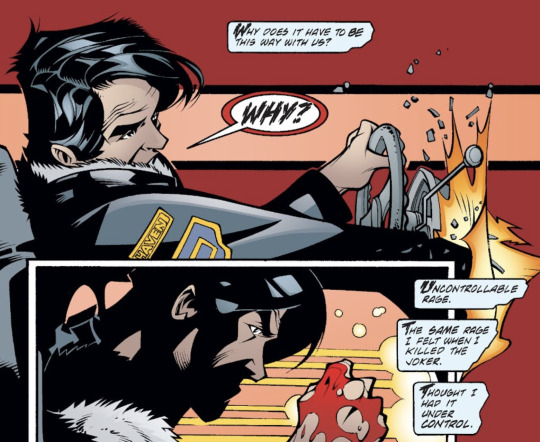
Nightwing (1996) #65
When Dick mentions struggling with his temper, he is almost always talking about the anger he feels towards criminals, not loved ones. When he sees people hurt or in danger, especially those closest to him, he gets pissed and can go too far. He often gets angry in defense of his family and those he protects.
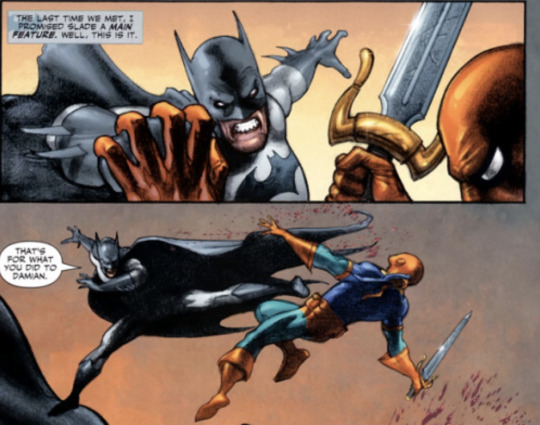
Titans Vol. 2 #29
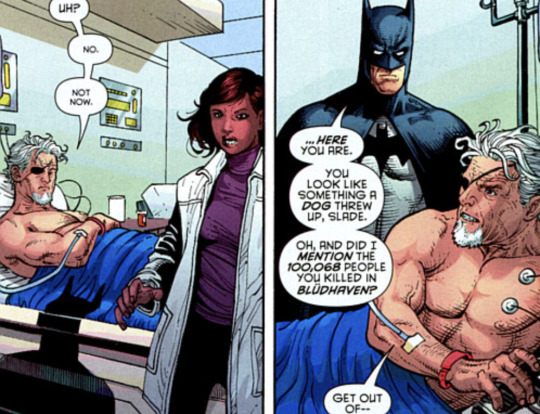
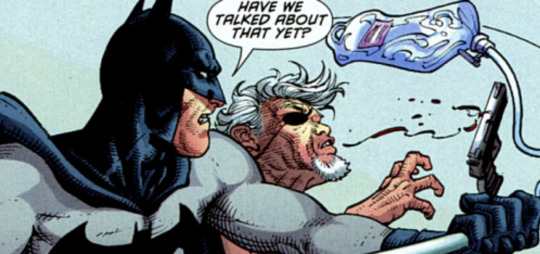
Batman and Robin #12
In fact, one of the biggest examples of his temper is him beating the Joker to death, as a result of the Joker killing Jason and Tim. Like many heroes, Dick struggles with not crossing the line when faced with crime; this doesn’t mean that he is the same way with those he loves.
2.) In most circumstances, Dick has demonstrated excellent control of his anger. So, Dick may have a bad temper...but it usually doesn’t make an appearance unless he is under an immense amount of pressure (and sometimes not even then).
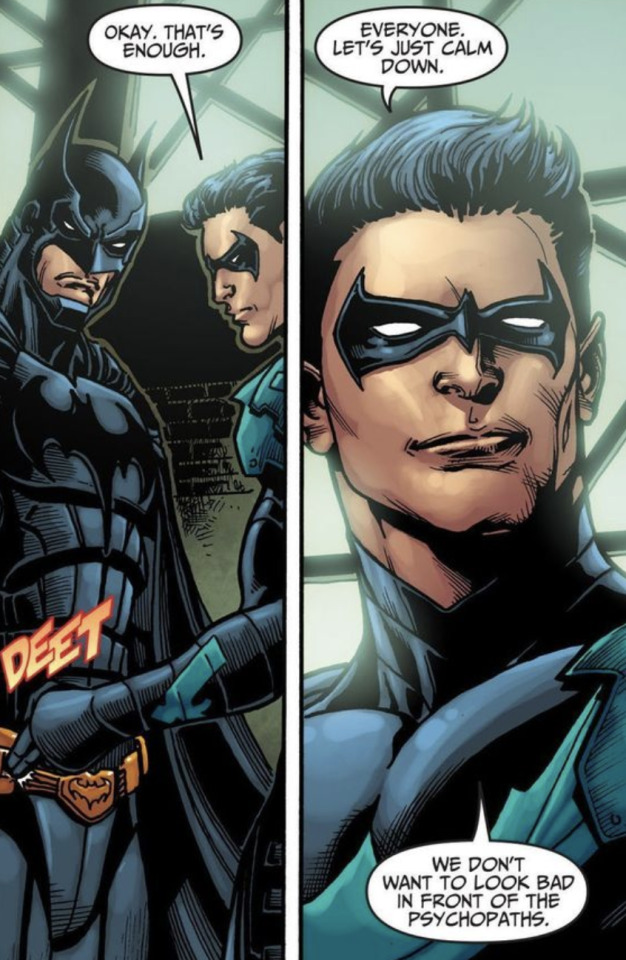
Injustice Gods Among Us #16
Dick’s not a doormat and he can be confrontational if that’s what is needed to get the job done, but he is also known for keeping a cool head under immense pressure and stress. He’s known in the superhero community for resolving conflict and has often been called “the glue” that keeps various teams together. That wouldn’t mesh with the idea that he is constantly losing his temper. In fact, his middle name might as well be de-escalation, because that’s pretty consistently what he does. Look at how he acts in various arguments:
Example #1: While Nightwing is off-world with the Titans, Jason dies. Likely struggling with grief, Bruce doesn’t attempt to contact Dick while he is off world or when he returns. Dick is left to find out through a teammate, Danny Chase. Despite being left in the dark, Dick still goes to the cave to try to support Bruce. He puts his feelings to the side, and doesn’t even bring up the fact that he was hurt by Bruce’s exclusion. Unfortunately, the conversation derails regardless, and Bruce ends up hitting Dick and telling him that it was a mistake to invite Dick into his life.
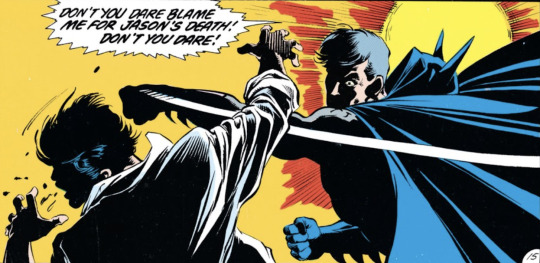
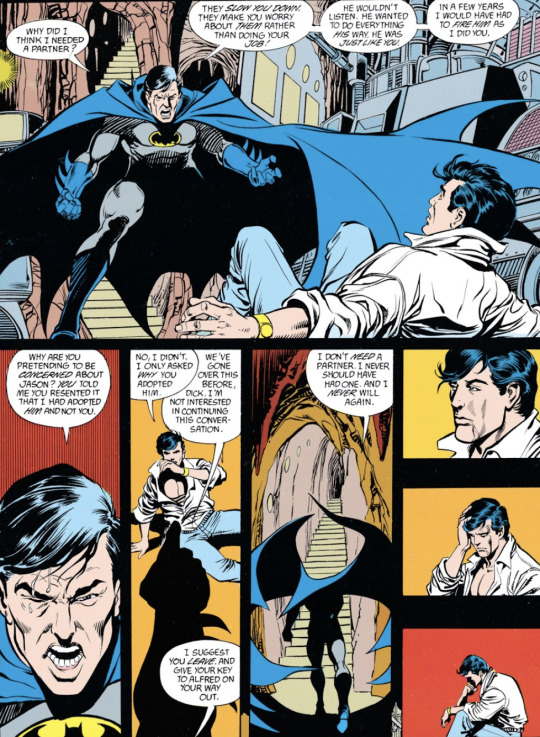
The New Teen Titans #55
Look at how Dick reacts. Even when Batman hits him and yells extremely harsh things at him, he doesn’t lash out in turn or yell back. He keeps calm and continues to talk to Batman; he likely understands that this is a product of Bruce’s grief and as a result allows his feelings/hurts to go unaddressed.
Example #2 (inspired by @hood-ex post here): Garth loses his temper when he learns that the Titans won’t help him with a problem he’s having. When Robin tries to stop the fight, Garth punches him.
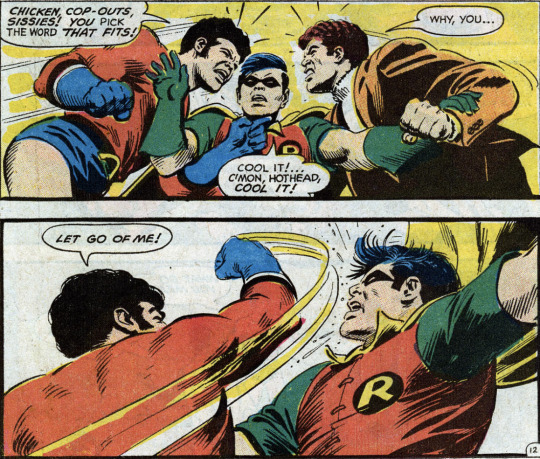
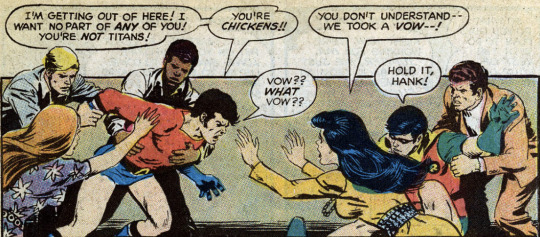
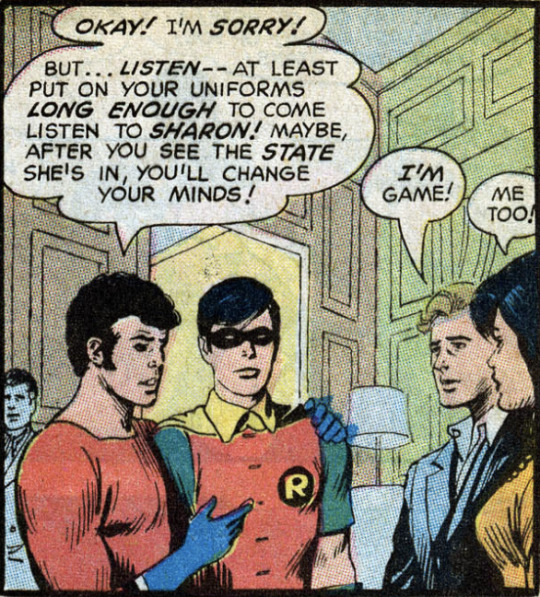
Teen Titans (1966) #28
After he takes the hit, Dick continues to try to keep people from fighting, and in the end, Dick once again puts his bruised feelings to the side and doesn’t say a word of complaint to keep team unity. He still goes and helps Garth with his problem.
Example #3: After Donna’s death, Dick was devastated. He spiraled into depression. In the aftermath, he was stricter and quicker to anger than he would normally be. Even his leadership of the Outsiders was effected, and as a result, Anissa, Black Lightning’s daughter, was seriously hurt. Black Lightning is not pleased; he slams Nightwing against a wall and yells at him.
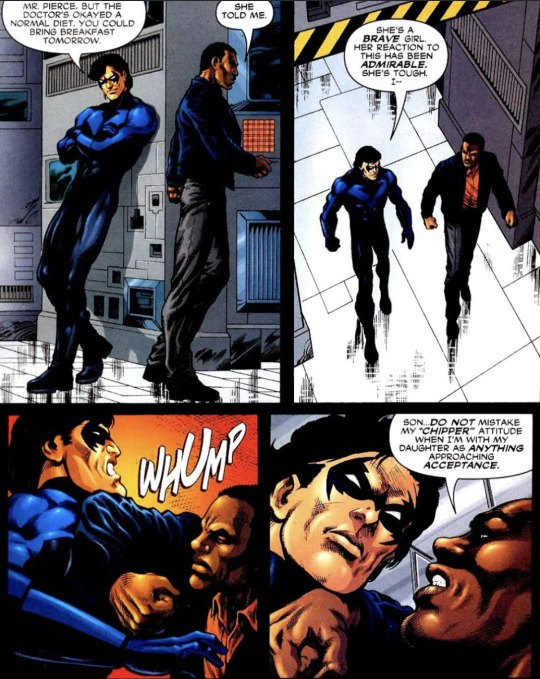
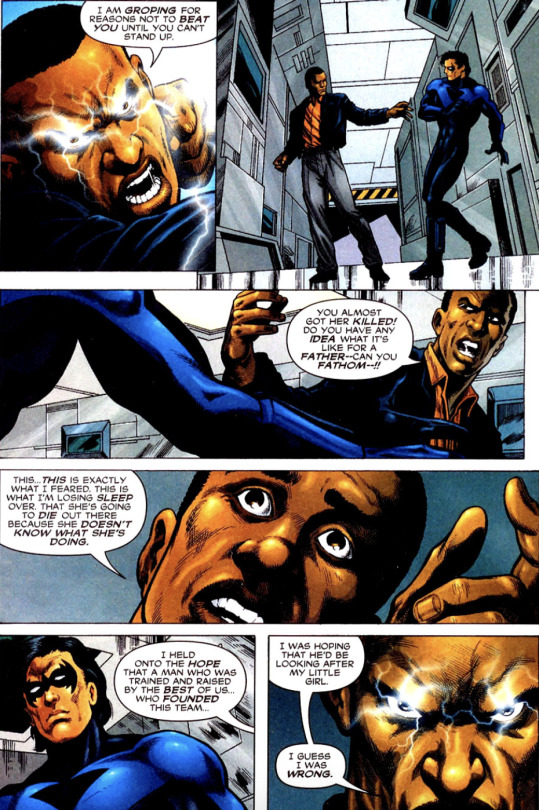
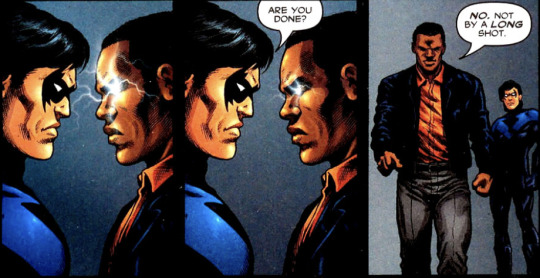
Outsiders (2003) #16
Even when Dick is emotionally compromised and short tempered, he still isn’t looking for a fight. He doesn’t retaliate when Black Lightning slams him against the wall, and he doesn’t interrupt when Pierce tears into him (for a whole page of the comic). It’s not like Pierce goes easy with his criticism; yet, Dick remains stoic and takes it. He doesn’t say a word of complaint or defense, and he doesn’t lash out. He keeps his temper under control. (Just an fyi for those wondering, but this is definitely one of those times Dick deserved a harsh talking to, lmao, support you Black Lightning!!)
Example #4: The Batfam is fighting a villain known as Mother, who is known for brainwashing people. Anyone could be in her control, so when Tim is acting suspiciously, Dick decides to investigate to ensure that Tim is not a double agent. Dick finds out that Tim secretly kept his family in a hidden location to protect them, and unintentionally brings trouble to their door. On the flip side, Tim gets angry at Dick for sneaking around behind his back and putting his family in danger. Though Dick tries to explain his actions, Tim won’t hear it and instead throws a punch.
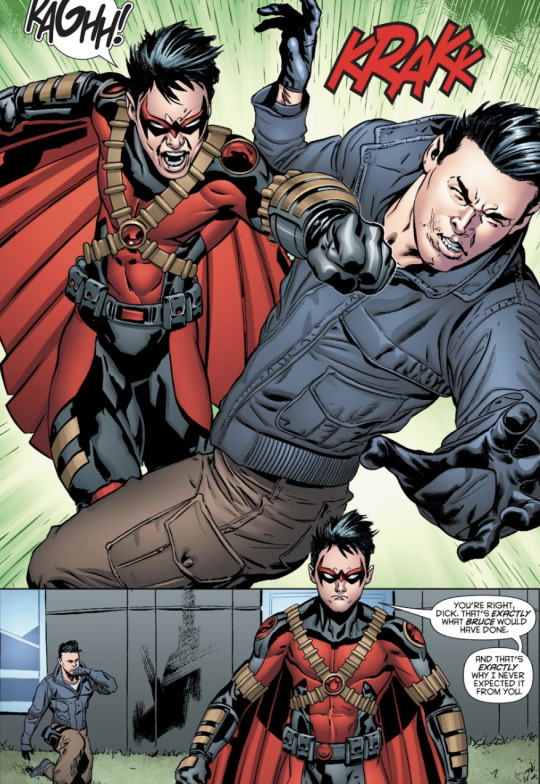
Batman and Robin Eternal #5
Even when Tim punches him out of the blue, ironically because he can’t control his temper, Dick just takes the hit and lets him walk away. He doesn’t ever push Tim for an apology, and Tim never gives one. The rest of the series, people give Dick crap for betraying Tim’s trust, and despite Dick’s reasonable concerns being the impetus for his actions, Dick accepts the other’s criticism without complaint.
Examples #5-57: Just think of all the times that Damian insulted Dick and told him he couldn’t cut it and generally was acting like a little shit, when Dick was struggling with Batman’s death and with taking on the cowl and with running Bruce’s life, and Dick still never gave up on Damian and gave him Robin. Very patient, very thick skin.
And I could add even more moments! I don’t mean to go overboard, but the idea is that, over pretty much his entire history, from Robin to Nightwing to Batman and back, there are more times that Dick puts his feelings to the side and lets people yell at him (and basically physically assault him RIP) for the greater good, then times he flies off the handle and loses his temper, especially when compared to other characters in the Batfam. Seeing people say that Dick is secretly an angry asshole when pushed a little or is always blowing things out of proportion and being whiny is just annoying, especially when Dick canonically has worked very hard to keep his cool and mediate in various tense situations, even when he has reason to get offended and retaliate.
And this isn’t me saying that Dick can’t lash out, cause duh he’s a human being and he’s not perfect. He does have a temper and sometimes can say harsh things to those he loves. But, he doesn’t usually lose his cool, and when he does it is usually a surprise. The rarity of Nightwing giving into his temper is part of the reason it is so impactful when he does fly off the handle.
A lot of the panels you see floating around about Dick’s temper are 1) from times he was brainwashed or mentally influenced (Dick yelling at Donna, Alfred, and Joey are all from a single time when he was brainwashed by Brotherblood for example), 2) from times he was in great emotional/mental distress from the deaths of those close to him, or 3) examples of times that Dick is standing up for himself, that I don’t really see as him having a temper? And a lot of those fights/arguments that are shown are not as one sided as tumblr makes them seem, lmao. Either way, most of these times aren’t really representative of his normal behavior or attitude.
In conclusion, Dick isn’t some petty jerk with anger management issues; he’s a human being, who sometimes gets angry and upset like every other human being in the world. He has a temper, but I don’t feel like it should define him in the way and to the extent that it currently does.
P.S. This isn’t me trying to excuse the times that Dick has been nasty and let his temper run away from him, obviously. Like I said, he’s human and he’s made mistakes. But he doesn’t lash out normally or often. I’m just trying to put things in perspective.
#batman is prob the only one who can really make him lose it#and bruce kind of deserves a little talk back in my opinion lmao#plus his temper has literally vanished into thin air#in these rebirth comics#so for people to be making it so integral#is just trying to make Dick out to be a jerk lmao#nightwing#dick grayson#bruce wayne#batman#tim drake#red robin#teen titans#outsiders#temper#dick grayson temper#character analysis#meta
585 notes
·
View notes
Text
Why Cinder Fall Carries The Thematic Message Of RWBY's Antagonists...
And What That Could Mean For Her Character.
...
Now, from an audience's perspective, I would say that the outcome of RWBY's villains carry the theme of, No matter your past or the moments that lead up to this point, one will eventually come at a crossroads where they decide what they want to be and what they want to do with their life, whether they want to be 'good' or 'bad'. And that, from what we've seen so far regarding our antagonists like Adam, Roman and Clover (more on him later) choosing the 'bad' whatever that might be in their situation, would have devastating consequences.
But first and foremost, they will and have to be given a choice.
Now admitedly these instances where characters are given these choices are either implicit, nuanced or are given in a second with minor characters which are in the majority and shall be addressed first.
...
Given Roman's last confrontation with Ruby, it can be said that he have long since chosen his path and that the consequences of that choice finally arrived. Although CRWBY not able to cast him for future volumes definitely plays a big part in this. So I don't want to place top my h weight on this charater, even if it's worth mentioning.
Of course we have Adam. Now his backstory definitely propels him down his path of spite and destruction, but one would be wrong by saying that other faunus, maybe even Ghira and especially Blake, have not tried their best to help him chose a better way to fight for his cause and work through his past by showing him the possibility of a better life. I mean isn't that part of the reason Blake stayed? Because of the hope that he could change and could be better, going so far as to try to tell herself that he isn't the monster he is becoming? Even Sienna, although her in own skewed way, tried to direct Adam's path. But Adam continuously chooses the path of spite and hate after every fight and altercation with Blake and Yang. Adam has had many chances, the fact that we didn't see what these different choices could amount to, is simply due to the fact that he has already made up his mind, and that, keep in mind, he was still a relatively minor charater compared to the rest. Adam's final crossroads with Blake and Yang approached, and he paid the consequences.
Now we Clover, and as an antagonist in his final scene the same would apply. He had the choice between capturing Qrow or Tyrian. Following orders or doing what is right. I bring this up to illustrate that even what seems to be a simple theme, there are still variations and exceptions, such as the gravity of the choices and consequences, that further reaffirms and explores the theme.
And I adress this theme through minor characters first, because if they are so clearly seen in them, then it's irrefutable that they are present in the main characters. But before we get to the main antagonists, because they do have a lot more complexities attached to them, let's look at the opposite end of the message to make sure it even holds up when explored.
If an antagonist continuously goes down the wrong path it will lead to negative consequences, then choosing the right path, will bring about a happier ending. And for a fandom that seems so caught up with the concept of 'redemption' (in quotation marks because I have a very different view on what that is and should look like, and I don't know if I'll be able to get to it in this post) one would think that RWBY would be rampant with 'redemption' arcs. But we've only seen one redemption throughout the whole show.
...
And that is Illia's arc.
She's interesting in that I see her as a foil to Adam (a post that I'm sure has already been made). Her change at deciding to change and lead a better life as well as the person to support her through this change, is also Blake. And when Illia does decide to do good, we are shown that she is not only happier, but she is working alongside Ghira to bring about the positive change within the White Fang, that she has sought to do for so long. Just like Adam, Illia has experienced incredible trauma because of the SDC, but she chose to not let it define her in the end.
...
Now, enough about these minor characters, let's look at team WTCH.
When we see Tyrian and Watts, and through the snippets of implicit backstory, that they have already chosen Salem against all else and that they are set in that choice. I've brought up antagonists who have already chosen their path like Roman, and they are important because since they are already solidified an antagonist who has no desite to change, they pose a much bigger threat and it adds variation to the theme in how it's presented.
Now Hazel interestingly has been the only one who understands the means of what they are doing and the negative consequences of their actions, but that for him, it is ultimately justified. Even so, Hazel does use force as a last resort. And what was more surprising, was the reveal that Hazel aligned himself with Salem, not because he necessarily believes in what she is doing, but that she is impossible to go against. This most likely makes him feel that there isn't any choice, not with an equal possibility of outcome at least. But Ozpin/Oscar challenges that notion. He tells Hazel that Salem can be fought and he gives him a choice, or at least an option to chose his role in this battle. Because of our track record of antagonists sticking to their initial role in the narrative, it would make sense to deviate from that and give us Hazel who has the possibility of turning to the good side. However, how this plays out has yet to be seen. I do think that he would die in the end. Why? Because the narrative has yet to show how a charater can enact positive change and be better, even if they might not get to see the full extent of their actions. In short, exploration of the theme. Because the theme does not equate choosing the path of 'good' with the promise of living, simply that there will be positive outcome of such a decision but what that looks like will be different depending on the charater. Of course this means that that choosing the path of 'bad' won't necessarily mean death. It could mean being imprisoned (Looking at Ironwood, possibly Mercury) or something lighter that simply means having to move locations often and be on guard (Looking at Neo). These outcomes still fall in line with the show's message regarding villans but because they lie on it's outskirts, I would expect them to be portrayed sparingly at best, as not to risk betraying what has already established but still maintain a sense of 'realism'.
...
Now, I've been talking about how the theme essentially brings about the 'good guys' winning and the 'bad guys' losing, but that could literally be any other piece of media. But like I said in the very beginning, it is only the outcome of the theme, not the theme itself. What makes RWBY's message regarding its antagonists so different, is its emphasis on choice.
And that brings us to the true message.
That bad people can and should be given a chance to be better, to become better people.
This doesn't mean that people would take that road, or that they would want to change, but that they should be given it nonetheless. Some people will get more than once chance, and some of those consequences will be more dire than others. Not everyone can easily become better, but for everyone there will be a possibility, no matter how small.
...
And this brings us to Cinder Fall.
Now, in light of the events in her backstory, some would consider Cinder killing Rhodes instead of surrendering to be her crossroads. After all it I'd what firmly set her in place to seek power in the name of freedom. And if this was shown to us sooner, if Cinder died in volume 3 or 5, I would have agreed… to an extent. If Cinder was a more minor charater, or died in volume 3 or 5, that scene would have been enough content to show and give us an explaination for her choice and it leading to her downfall. As for why only partly agree? Because it wasn't presented as a choice. Killing Rhodes and her abusers weren't a crossroad, but rather a threshold, even if it's one she chose to cross. Because the path presented to her was the only one Cinder believed is available to her. Remember, it's also important to think how these choices are presented to the characters and whether they see them as such. Of course, it's important to remember that Cinder is a main villain, our first villian and the only cillian we've seen struggling to this extent, it makes sense that her story is much more detailed and complex, but there is another reason I will get to later (she is also not the only one whose story has been treated as such, but more on that later.)
So Cinder has been shown to make choies that garders to her current goal of achieving power. But only because she is not presented with another path that gives her the freedom she wants (keep in mind that does does not exuse Cinder's actions or that she shouldn't face the consequences thereof, and trust me, she has faced many). Salem does not give her choices. She gives Cinder a path, a way forward, and consequences should she not take it.
Becoming part of Salem's ranks wasn't her crossroads either. Only, Cinder *thinks* it is. She thinks she has chosen the path to freedom, but she will eventually come to the realisation that this is not it. That there is another way. And the only thing that can show her this.
...
The Relic of Choice.
While Emerald and perhaps Neo will be the ones to support her if she chooses to become a better person, the person she wanted to be, no person could ever convince her that something like that exists. Not after what she has seen in humanity.
But the relic can.
It can show her a future where she does take a different path, and one where she doesn't.
This is Cinder's crossroads. Getting to the Relic is the end goal that has been unknownly set up for Cinder since the beginning. The Relic will most likely be the last thing that stands between humanity's destruction, it represents the height of the final conflict and ties into Cinder's charater specifically. For once it is not something she necessarily wants, but something that she needs. That is why Cinder carries the thematic message around RWBY's villains. Because if it were anyone else, any other relic, any other Maiden, the theme would not hold up. It would be something entirely else.
...
Cinder is at her crossroads.
She has been shown to where each path leads.
What will she choose?
The theme only says that one should be given the option to chose to be good, not that they will or should.
It could go either way.
But I believe Cinder will turn to walk down the path of good.
And here I can hear half of of you groaning. But before we go into why I think so, because again, everything at this point is simply my prediction, let's look at what will happen if Cinder choses power over true freedom.
She will most likely die, of that I have little doubt, or sentenced to life in prison or constant running at the very least. This all runs in accrodance to the theme. A main villian stays on the road of evil despite being shown a better way, and pays dearly for it. Only...RWBY has already done this…
...
With Salem!
As our big bad and one of the main villians and the pure epic that was 'The Lost' fable, we have seen all the prominent moments and choices who made Salem who she is. And at every turn, the death of Ozma, the death and rebirth of the world, Salem has chosen the path of Darkness and not just figuratively either. (And yet, they still managed to make her sympathetic at one point which is a commendable feat). The gods might have been cruel in their punishments, but all things considered, gracious inhow many times they have given her the option to change her ways. Of course Salem's final decision came with the death of Ozma and her children.
Salem might be the big bad, and defeating her is the end goal, her actions dive the basis of the plot and our heroes' actions. As these final moments of her story concedes with Cinder's story, I very much like the idea of the story ending with the defeat of the antagonist who chooses the path of darkness, while one of RWBY's main themes linger in its audience's mind as another antagonist chooses the path of good, a new life. Now I'm getting much to sappy and caught up in these satisfying nuances and touches.
But my main point has been made. Cinder will choose to change, but what could this new life look like? What are the consequences? After all, we've already established that the gravity of the outcome does not concede with the choice even if it it is presented as positive for good and negative for bad.
In short, could Cinder's change be an act of goodness that concedes with her death?
...
It could, but I don't think it will.
While it is true that the death of a charater could carry a positive outcome to others, it does not align with Cinder's goal of freedom, therefore death would be seen as a punishment and contradict the theme itself. And because Cinder is the charater who embodies it, it means that the end of her story should end on a positive note.
This doesn't mean Cinder becoming a better person will be easy, it doesn't mean that she should be forgiven, that she shouldn't face the consequences of her past.
But after everything she went through, after all her struggles and trauma, Cinder would have the life her younger self wanted. The freedom she wanted to choose for herself.
And I think that is a ending we can, and should hope for...
46 notes
·
View notes
Text

So as promised, a follow up to this monstrosity of a post, now talking about my top ten favorite characters.
So as I’ve said before, I tend to not have one favorite character but rather a herd of them that I love for a variety of reasons. So the following list and gushing is in no particular order, as I can’t really rank them bc I like them all for different reasons.
1. Noelle
To this day, Noelle remains the ONLY character I have ever yelled at a TV screen for because I was so hyped for her. During the Sea Temple Arc I was literally yelling at the TV for her to kick ass and take names, I love her so much. 🥺
Does she have issues? Yes! But that’s okay—she’s had an amazing character arc so far, and watching her go from insecure and hiding behind arrogance to actually having confidence in herself and her abilities has been so amazing. More than anything she feels real to me, and is one of the few characters where I have had the visceral urge to squish her cheeks and tell her she’s doing great honey, keep kicking ass. We stan Noelle in my house 😤
2. Luck
I love this kid, for both his antics and the fact that I can relate to how he’s basically repressed his negative emotions for so long that he struggles to express anything but cheerfulness, even when murderously angry. He goes from equating his worth to being able to fight and win (see his fight with Lotus) to valuing his found family with the Bulls so damn much. His breakdown during the Reincarnation Arc wrenches at my heart every time!! I love this chaotic destruction child.
3. Langris
He’s a gremlin trashbaby. He’s an awful entitled asshole who always got whatever he wanted when he wanted it, and was that one Gifted Kid who always had everything come easy. And...he gets knocked off that pedestal and starts to grow as a person, however reluctantly. He’s one of those characters where if I were to ever meet him in person I’d either hate him immediately or want to troll him relentlessly, but I still love him as a character because he’s interesting.
In a lot of ways, I relate to Langris. Younger sibling with so much pressure to be the best, from both yourself and your parents, and your older sibling—who’s supposed to be better than you, someone for you to look up to—just...isn’t to your parents’s standards. And that makes the pressure worse, until you’ve been swallowed whole by the pressure and expectations and you don’t know who you are without that.
It’s three parts the asshole grew on me like a fungus and one part projection, but I love him anyway.
4. William
I have a soft spot for William that’s born from a) the fact I’m a huge sucker for the mysterious masked guy who’s Soft for his people, and b) he’s a coy troll and I deeply appreciate it.
I acknowledge—he has his flaws. He’s a coward and indecisive, but he’s learning to grow past that. That’s a huge part of what makes his character interesting and compelling to me, because he’s always been fiercely loyal—his problem was being torn between two conflicting loyalties and being unable and/or unwilling to decide between them.
5. Leopold
Fuzzy determined lion son, who is determined to surpass his brother? And wholesomely competitive? We stan!! I want to hug this kid 🥺
6. Dorothy
She’s fun, bright, and determined. There’s also a lot of implied depth when you look at her comments to Reve in the Reincarnation Arc—aside from Reve, she literally says “we finally have someone to share our dreams with!” And that breaks my heart a little because that’s such a lonely thing to say.
Overall she’s just great and I love her, and I really want to see more of her and her magic.
7. Asta
He’s a cinnamon roll, what more can I say? I love him, even if I didn’t rly like him at first. He’s a loud cinnamon roll and I will protect this boy with my life 💕
8. Finral
Anxious self-sabotaging boy!!! He reminds me a lot of a lot of people I know, and of facets of my own personality. And he works so hard to grow, his role and growth is amazing and I love him. I just wish his womanizing weren’t portrayed the way it is—and that the fandom could also note that he’s also not a damn sexual harasser. He tries really hard to get a date while being respectful—and it really doesn’t feel in character for him to sexually harass people, so I don’t know where people got this image of him being one. He’s a flirt, but for the most part it’s harmless and he respects boundaries. 👀
9. Patry
Okay so this is a bit of a fine distinction to make: I love and appreciate him as a character, I think he’s an excellent villain, and I appreciate that so far he hasn’t been exonerated from his crimes and mistakes, because he shouldn’t be. He needs to atone, and that takes time—and he may never earn forgiveness. That’s fine and in fact that’s the point!!!
He’s an excellent villain: he’s charismatic, intense, and he feels real. He’s understandable, even when he’s going to such zealous extremes. And as a character, I love him.
And here’s where the line is, because he’s the only one on this list that I have this sort of opposing opinion about. I adore him as a villain, as a character, and how he’s dealt with. It’s on point, amazing. As a person? He’s fucking despicable and if I ever met him in person I’d want to break his damn jaw. And it’s not the same as how I feel about Langris—Patry is a despicable person, and even if he grows and works to atone, he still did those things. He still decided to go through with those actions, and he shouldn’t be forgiven for it. He’s intense and complicated and real, and that’s what makes him interesting.
He’s on this list because I feel so strongly about him—he’s one of my favorite and my most hated characters in the show.
10. Marx
I’m not going to lie, I love this man purely based on that fact that I first saw him yelling at Julius and went “ah, the overworked secretary trope” and then he met Asta and I went “OH. Kind soft man who is also overworked secretary and cares deeply? Sign me the hell up!!!” What more do I need to say? He’s great 😊
#black clover#anon ask#noelle silva#luck voltia#langris vaude#asta black clover#william vangeance#black clover patri#dorothy unsworth#marx francois#leopold vermillion#finral roulacase#just me and a bunch of cinnamon rolls and trash children#I will fight for all of these characters#....except Patry#Patry deserves to be punched in the face a few times#it’s complicated okay???
49 notes
·
View notes
Note
Equating 'starting down the path to the Dark Side' with becoming pissed once, is as good as saying every person in the history of every galaxy is gonna be dominated by the dark side forever. And Leia would have gone over to it about 32746857836 times over Luke. And Rey too. Luke does not deserve to feel "Shame" or be saddled with a bad-guy plot contrivance because at one point in a throne room of 2 most evil ppl in the galaxy, he didn't just lay down and die. Fuck the sequels forever.
“BECOMING PISSED ONCE” AKSDJFGKHHJ????
yeah guys remember the original Star Wars trilogy where Luke famously... became pissed once? in all the films? king what in the genuine fuck are you talking about
do you think Luke’s arc (which revolves around the fact that he nearly becomes evil) shows that he’s just as likely as any other fucking random person to become corrupted by the Dark Side? like I’m begging you to look me in the eye and tell me that based on the events of the original trilogy and the sequel trilogy Luke is LESS LIKELY THAN LEIA to give in to the Dark Side
never mind that Luke was giving into his Dark impulses and having visions of himself as an evil villain midway through the second movie before he had even met Darth Vader and didn’t know they were related? you remember that scene on Dagobah right or am I having hallucinations and delusions
never mind that when he “became pissed once” (ajsdfkgjhkh) in the Emperor’s throne room he was doing EXACTLY what the Emperor was taunting him into doing -- allowing himself to be corrupted by the Dark Side. like he went into the throne room with the verbally expressed attitude of “I am not going to fight you because fighting you is a Dark Side behaviour” and then eventually he does exactly that because he is struggling with Dark Side impulses and acts upon them
and I’m not even talking about ~nearly~ giving in to the Dark Side, he doesn’t get Very Close to being Bad but actually decide to do a good thing instead. He does the bad thing!!! Fighting Vader and nearly killing him is ACTIVE Dark Side behaviour that is stated as villainous within the explicit text of the films. he gets dangerously close to going Full Vader-Level Villain Mode and then stops himself midway through because he identifies the actions he’s currently doing as Dark Side Bad Actions
and never mind that when he stops himself and throws away his lighsaber it’s very explicitly his rejection of the Dark Side, not just rejection of... the emperor’s job offer lol
like, do you think that when he doesn’t kill Vader he only stops himself because he doesn’t want to do what the Emperor wants? or because he thinks it’s mean and is embarrassed that he got so angry? or because he just doesn’t fancy being the emperor’s apprentice?
like do you really think the thematic climax of the entire trilogy is that shallow and petty aksdfjhgkg? his narrative and thematic arc over the movies explicitly relates to his impulse to give in to the Dark Side and his active decision not to even after he’s let it corrupt him. the entire POINT OF THE MOVIES is that he is pretty shit at rejecting the Dark Side and even ends up giving in to it but in the eleventh hour realises he’s better than that and decides to embrace the Light instead. this isn’t subtext by the way it’s just the explicit text of the movie. they even colour coded his outfit in the film to make it easier for you to understand as a viewer and made a little bit of white peek out from his all-back costume at the end to demonstrate visually that even though he had been manipulated into becoming a Boy Behaving Badly he was now Nice Again Yay
but even that is never established as him being like... free from the Dark Side, or incorruptible now, or wholly a heroic nice boy, obviously he’s still gonna fucking struggle, especially since he already dabbled in the Dark Side once before, and especially in times of intense fear or anger
like Yoda states outright that fear of loss is a path to the dark side, and says directly out loud to the audience that fear is a slippery slope to even more fucked up things like anger and hate and suffering
and Luke senses darkness within Ben Solo and knows with absolute certainty that he will LOSE (capitalised for emphasis) everything he cares about and has built, and because fear of loss is a path to the Dark Side and also he’s literally been struggling with the Dark Side for the past like 30 years and was 0.5 seconds away from becoming an evil villain at one point in time, he has the Dark Side impulse to kill Ben but realises straight away that that’s really fucked up actually and stops himself because as we established in the previous trilogy, he is better than that
and he feels ashamed of it because... of course he fucking did it was bad... but he’s presented sympathetically and we’re meant to understand based on what we know about him as a character and his personal history lmao. he’s never presented as a villain by the movie for that, just as someone who nearly made a bad choice, which by the way is BETTER than his behaviour in Return of the Jedi, where he actively MADE the bad choice and then midway through was like oof lol whoops
in fact Yoda even tells him directly in the same film that mistakes and failures are opportunities for reflection and growth and his failure with Ben and his impulse to kill his nephew are clear in-text examples of that exact theme (the main theme of the film) and you as an audience are meant to understand that Luke very nearly making a fucked up choice is less important than the lesson he learned from it
like... that’s not a bad-guy plot contrivance? it’s a central theme of the original trilogy being explored in more depth in The Last Jedi but you either half-watched Return of the Jedi or don’t know how to identify themes in films even when they’re spoken directly to the camera because you seem to think Luke Sometimes Behaves In Bad Ways And Makes Fucked Up Choices is like... new information in TLJ lmao WHAT????
“BECOMING PISSED ONCE” I’m gonna kill myself bye
17 notes
·
View notes
Text
COMPLETED: Breath of Fire 3

It is done. God is dead. Well...a self-proclaimed god. While we cheated, my son and I did beat the game...and, despite this being one of my favorite RPGs, it's uh...my first time "beating" it.
So! We crossed the desert into the futuristic city that now lies in ruins and took the elevator up to the Myria Orbital station. It's, uh, a space station connected to the earth by an elevator shaft...I guess.
Concept Art
After all the wandering about, I was pretty ready to meet "God" and get this over with--but it's the finale, so they had to make it count. We wandered about, trying to feel our way around the "space station". Eventually, we found a room I had forgotten about...it had electrified floors. To un-electrify them, there are three consoles. Each console has a pattern of negative and positive signs on a grid. You have to get the three patterns to over-lap so that the postive-negative charges cancel each other out. But with three panels, you run into issues of two positives and one negative occupying the same space: thus it stays electrified.
Clever idea: yes. Fun idea: no.
One console is in the room with the floor, and the other two consoles are in a completely different room, separated by a 30 second walk not counting the one or two random battles you're likely to get. I got really frustrated, and my son went and told my wife: "That game is making daddy nuts!"
Anyway, I figured it out and moved on. This required a boss fight (easy enough cause we're cheating), which got us a keycard and special plant-killing shells for Momo. Going back to the other wing of the station, Momo uses the special shells to blow up plant vines blocking the door (not unlike a puzzle in Resident Evil 2...).
I think beyond this, we find a labyrinth of utility hallways. I had to back track a few times. Eventually we get to an indoor garden.
FLASHBACK: (not in the game, but mine)
Back when I first tried to play this game, I defeated every challenge thrown at me. I think I did have the guide to the game, but it was mostly used to help me through some sticky parts (and look at the cool art!). I made it to the final dungeon (Myria Station) but struggled to beat the final boss.
As a matter of fact. I never beat the final boss.
I needed to be a higher level. To reach that level, I did some grinding in the garden area. Mostly, you fight Plant 42s, which I loved since it was a reference to the mutated Resident Evil plant. But it shocked me to see that the exp was about 800, when there are fights elsewhere in the station that land closer to the 2k range. Surely that would have been more effective leveling?
Either way--I just never got strong enough to win the final boss.
BACK TO PRESENT:
We find Teepo here. Jack and Rei are surprised as hell! My son was excited, cause we all thought Teepo was dead. Turns out, Teepo is also a dragon, just like Jack. But instead of wandering the world with Garr and Nina, he joined the Goddess Myria who convinced him that his powers were dangerous. So he surrendered himself to her and is now her brain-washed lapdog, more or less.
Teepo causes Ryu to go into a weird dream (which we had to play twice due to game-freeze). Here, Ryu is exposed to the thoughts and anxieties of his party members. This is supposed to convince him to surrender his power like Teepo, but it doesn't.
Nina apparently struggles to please her mother by being a good, respectable princess while also trying to be herself and pursue her own sense of justice: such as helping Ryu and saving Rei!
Rei...I guess is concerned about his own power as Weretiger. Mostly, he just seems to want to help his old friend?
Garr wants to reconcile why he was ordered to kill hundreds of dragons, especially then they easily could have defended themselves--but they didn't.
Momo wants to understand all the advanced tech here, and how it could be used to better the world.
Peco is apparently the fucking tree of Yggdrassil in mobile form, and wanders about with thousands of years worth of world-knowledge, but can't communicate it to the team cause he doesn't speak English.
So anyway, Ryu doesn't relent and Teepo must be defeated. He dies and turns into a purple dragon. Rei and Ryu are sad, but yo--dick move.
Next, we have to find our way to Myria. First, there's this confusing 3 level maze of boss rooms that have you fighting past bosses, sometimes several at a time. It was annoying, and my son was done with it. WE JUST WANT TO MEET GOD!
Once through, we find a super sci-fi, futuristic room with holograms explaining Myria's intentions. The advanced world was being consumed by sand. My guess is that pollution made that world self destructive. Myria led her people to a greener, more flourishing land and then built a giant ocean between them to stop the sands. She also made the ocean very dangerous so the humans wouldn't return. Some how, she feared the power of the dragons would bring about another sand-issue, so she had them killed to save humans.
Now, this seems like a Lost scenario where Myria is no God, and likely didn't actually build any oceans. Instead, she helped people escape their self-destructive technology, and then controlled people's knowledge of tech so they wouldn't repeat past mistakes. So basically, she kept building machines and letting them fall in the ocean so they'd wash up on shore (Steel Beach). This allowed people to use machines a little, but not "make" machines.
I think she really feared dragon power as a threat to her own power, and wanted them out of the equation since they didn't submit to her rule. Since she martyred herself as a savior of humans, she felt justified in her genocide.
Ryu chooses whether to help her or fight her. But she warns that fighting her would mean facing the desert without her protection. Warning that holds little merit in my mind, cause she's a liar.
So we fought her. We defeated her.
The space station starts to crumble. Garr decides he's completed his journey and turns to stone like the other guardians. Everyone else escapes. Myria prays to God, asking, "If there is a God..." revealing that she was playing a part and did not actually know shit (like Jacob in Lost).
Afterwards, Ryu is seen joining his friends at a cliff overlooking a desert: fade to black.
Despite the many deviations the story takes for the sake of taking up time, I really enjoy this game. The world is well defined and the characters are good. Even the villains often have empathetic motivations, or perspectives that make you doubt your first conclusions. The game also tackles a variety of concepts that are morally challenging and deals with death and sacrifice in meaningful ways. It led to great conversations between my son and I. The last leg of the game is a bit tedious and shallow. I understand why they felt compelled to make it "bigger", but they used up most of their plot early on.
We cheated. We had infinite health and all that. Basically, we just killed all the grinding and retries. The game has a great story and fun mini games (and the sound track is fucking amazing!) so I don't think much is lost by skipping the tedious random battles and leveling up. If that's something you want as part of your experience, go for it.
It's just, for RPGs like this, the best things about them are story, characters, mini-games, puzzles, and exploring. The fighting is fine, and expected, but it shouldn't take up 70% of your play time when it's really only about 10% of the fun (if that).
So I feel no shame in cheating.
My son wants to play Breath of Fire 4 now. I'm excited to revisit this one (I actually beat it before (no cheating))!
#Zach's Game Journal#PLAYING#Breath of Fire 3#Breath of Fire III#PlayStation#DuckStation#PS1#Emulators#God is Dead#JK: she might be fine
9 notes
·
View notes
Note
Hey, I was reading your fic (I really like it by the way! Sasuke's, my favorite character, and I think you wrote him really well :D), and I was wondering, what's your writing process? I know everyone has something different that works for them, but how do you plan out your chapters, or get ideas, or things like that (very vague, I know, I'm sorry)?
Hiiiiiiiiiiii!!!!!!!!!! Thank you sugar plum for reading Maybe I’m Paying for the Things I’ve Done and liking my characterization of Sasuke, it’s very heartwarming and I appreciate it.
As for my writing process, oof. As you know everyone’s writing process is really different and it has been a joy to learn more about other people’s process to help figure out what works for me. This is something you can absolutely cherry pick with and try things out for the first time.
Timing: some people write better at certain points during the day, some people can start writing at 5am or write till 3am in the morning with a late start. I am a mix of both. I can start writing around 9am because that’s when my internal ticker is like “Let’s go to work now!” It’s just how my school and internship schedule line up. I also just write when I am bored(while in class sometimes) and late at night if I really have the momentum. Which happened for some of the chapters I have written for Maybe I’m Paying for the Things I’ve Done. So figure out what works for you. Also, timing myself sometimes helps, I use Pomodoro as a way to keep track of my work, I don’t necessarily take my short breaks.
Initial phase of writing: I draft first and I backwards outline as I go along and then I hit a wall. The idea circulates in the back of my mind and I either get a sense of a scene or a situation that I want the characters to go into and I start writing. Writing the story informs me where it’s going to go, it comes to me during the process. However, I will hit a wall. The fics I write are rarely short(shoutout to the people who can do short and sweet, your sense of pacing is unreal and I bow to your greatness) so there is a lot of worldbuilding, plot, and character development that needs to happen. Important thing to note, just because you are writing fanfiction doesn’t mean you can skip worldbuilding. It is very important!!!!!! It doesn’t need to be the crazy amount that I do but you need to set your reader up in a place and time so give some context.
Timeline: Things happen at certain places and times, and my characters will be a certain age when it happens, so I need to keep track. One of the walls I’ve hit is that for my current posted fic Sasuke spends time in jail, but how much time was not made clear in my non existent early planning and that changes the way things happen. And how old he is, and how much time should I spend on that prison sentence. If it was a long time then I need to talk about it as a life event that will have consequences throughout the entire fic, or if he was just detained until his lawyers came that changes Sasuke’s character. It also is a good way to talk about the criminal justice system of Konoha that I am making up. So I keep track of everyone’s ages, and birthdays, and sometimes I change them. I mean it is really hard for me to write baby ninja that go out into the battlefield when they are four years old and not make the entire fic about a shitty world like that. I don’t want to do that, it’s too fucking hard, and fluff feeds my soul. Also, seasons!!! That changes the way you set up your environment as well, from what I can tell Fire Country should have a monsoon season since they are so forested and are located near the equator of their world. So when that happens, if I decide to include that, is important for pacing of the story. I mean how long should this go on? Also, romance in the rain *hitn hint wink wink* who knows.
Outlining: I didn’t use to be an outline and to some extent I still am not. I have done a previous post explaining a little bit of it but I backwards outline to keep track of what is happening because it’s a lot of detail and I don’t want to make mistakes. However, spreadsheets are my jam. I didn’t use to be this way but my internship has changed me and now I like spreadsheets as a way to be organized. Huzzah *throws confetti in the air* to being a boring adult person! There are a couple of way to do this but first actual writing notes:
5 commandments of story
Inciting incident
Progressive complications
Crisis
Climax
Resolution
This is something that helped me a lot when it came to structure, because sometimes my plot points are all happening at the same time and I’m like this makes no goddamn sense, what is happening. Story Grid is a podcast, and a book, and a website that can help you talk about structure. They can also talk to you about the Hero's journey. Take or leave whatever works for you because a lot of their stuff doesn’t work for me. But in doing their spreadsheets and exercises I learned what doesn’t work in a story. It’s how I realized pacing was a problem in my writing, and that I needed to take time away.
So they have sample spreadsheets that break down books into scenes, turning points, characters on stage, etc. Take what works and leave what doesn’t.
Back to spreadsheets, I have a story grid one for Maybe I’m Paying for the Things I’ve Done which I will backwards outline for the chapters I have already posted and a weird visual index card thing with the five commandments on my computer to help me figure out what is happening in my story.
It looks kind of like five boxes side by side with the five commandments written on each one.
Sometimes there is more than one box for progressive complication and that is fine, it is also fine if every scene you write doesn’t have a resolution, because by the end of the fic you will have one. I split this up by chapter, expected word count, POV.
Word count: Some people care about this, some people don’t. I don’t write stuff for ‘Maybe’ that is less than 10000 each chapter, there is way too much going on in the fic to do short chapters. For my other works in progress I find that I will be writing shorter, which is both easier and harder because it needs me to be concise and clear. Anyway, I do take notes from Story Grid in this because 50% of my words have to be for my middle build, while 25% each go to the opening hook and to the ending payoff. A scene is about 1200-2000 words.
Wiggle Room: Shit happens, you don’t do as much one day and you do a lot another. It’s okay, your story will evolve at certain points, it will tell you what to do. Don’t worry about it that much.
Struggle/villainy: Protagonists are often defined by their antagonists, and if that is the type of story you are writing make sure you spend just as much time on the villain of your story as you do the hero. They are major actors and deserve the attention. When I talk about the Akatsuki I am thinking that they are an international terrorist organization hellbent on kidnapping people that are systematically treated as weapons. There are a lot of moving parts for this. Also the characters themselves, Pein and Konana are radicalized in my story from peaceful revolutionaries to violent ones because they watched the leader of an institution murder their best friend, that will cause personal and political damage. It informs the way I write them or will.
Sasuke's struggle isn’t necessarily against a person, it is against himself. He wants a home because when he was little the one place where he felt safe was violated by his own brother, that is a hell of a trauma. Then he left his former home to go to Oto. Place has a huge part to play in Sasuke’s characterization and I tag homemaking in my fic because I want to show the process of creating a home for yourself as a process of revival and change and hope and vulnerability. It is a huge emotional labor of love and will be a focal point in the fic. That’s why I spend so much time talking about these goddamn renovations and art deco, it matters. This is a boy who has traveled all over the world and is now trying to put all the pieces of himself into one place, how he does it will be incredibly revealing of his characters.
Character: Emotional arcs are important for everyone. Try to figure out what your character is going to go through. It helps so much. Victoria Schwab asks her characters three questions:
What do they fear?
What do they want?
What are they willing to do to get what they want?
See if this helps. Also, understand that you got to develop your side characters as well, they act as a foil for the main character and add richness to the story, you will notice if they are flat. Understand the dynamics they bring to the story and to the world. Are they a woman in a field that is more socially acceptable for men? How does that affect them? What does gender look like in this world and how does this affect your characterization? Have they gone through physical/emotional trauma? Because that shit will keep coming up in a story, healing takes time. Also this is a fanfic, do whatever you want honey bear.
Vocab: the lovely @slexenskee told me to have a running doc of vocabulary and I am trying to do that.
I also have a running doc for a fic/character where I put all my brainstorming, little scenes, lines, vibes, questions into. And a doc for the synopsis of any new fic ideas I get.
Inspiration: Read, a lot. I read fics, I read fiction and fantasy books, I read non fiction and I read about other people’s writing process. I read the news, I read twitter threads, I read random quotes on Pinterest. I watch tv shows and take note of how they do characterization or pacing or plot. I listen to music, I couldn’t live without it. I am on Pinterest looking for vibes or aesthetics for my fics. When I first started writing, since my fic was inspired by another fic, I was worried it would be too similar, that worry is fading because I am doing more writing, and more reading as well. But you must consume culture in order to produce it. Also take breaks, sometimes you figure stuff out if you leave it alone or talk to friends about it. If you reach out to me about it, I will do my best to help so feel free.
IMPORTANT: DO NOT BE A RACIST/HOMOPHOBIS/TRANSPHOBIC/MISOGYNIST. UNDERSTAND THAT WHEN YOU WRITE A FANFICTION THE CHARACTERS ARE CODED IN A CERTAIN WAY. DON’T GO AROUND MAKING PEOPLE OF COLOR WHITE OR MORE LIGHT SKINNED THAN THEY ARE. WOMEN AND NON BINARY PEOPLE EXIST ALWAYS, IF YOU ARE NOT WRITING THEM INTO YOUR WORLD THAT MEANS YOU ARE MARGINALIZING THEM IN YOUR WORLD AND IN YOUR MIND. IF YOU ARE CISGENDERED BE DAMN CAREFUL ABOUT WRITING TRANS NARRATIVES, PROBABLY DON’T. WHEN I DECIDED TO INCLUDE MY OWN CULTURE INTO SASUKE’S CHARACTER AND PAST I DIDN’T MEAN TO MAKE HIM LESS EAST ASIAN BUT TO ADD PARTS OF MYSELF TO THE WORLD. ACCEPT AND ADAPT TO CRITICISM COMING YOUR WAY IN THIS SENSE. I AM SURE YOU WILL BE FINE, THIS IS JUST A STANDARD DISCLAIMER.
This was really long, and I hope you won't mind. Thanks again for this question, and let me know how your writing goes. Also listen to Deadline City the podcast.
#answers #fic writing #process #naruto
2 notes
·
View notes
Text
the republic of heaven
Back in 2000 when The Amber Spyglass came out I feel like there was not so much news in the world. At the turn of the millennium we seemed to be entering a more optimistic time. Tony Blair was elected in 1997 at the head of a liberal Labour government, and while it may be true that Blair would never be so popular again as he was in the opening years of his premiership, the Tories seemed hopelessly outdated by comparison. They were still the nasty party of old, while the country was ambitious, outward-looking, internationalist. Explicit racism and homophobia were no longer tolerated. We were Europhiles, but we weren’t part of Europe. There seemed to be a lot of money about.
At home there were occasional horrors — the murder of Jill Dando, the homophobic pub bombings in London, Harold Shipman — but they were somehow isolated, disparate, inexplicable. They were exceptional. There was the war in Kosovo, which set a template for liberal interventionism in years to come. The economy was trucking along; unemployment was low; for the first time there was a national minimum wage. I skim the headlines today and it seems like such a comfortable time by comparison. Perhaps I am remembering it wrong. But when the years to come would bring a spiral of endless war, recession, and one of the most significant declines in relative generational living standards, I’m not sure there is any need for rose-coloured glasses.
Into this comes The Amber Spyglass, which is basically quite an optimistic anti-authoritarian novel. It was also the book which, for a handful of reasons, really brought Philip Pullman to the world’s attention. It was this which ensured that his name still lurks around the list of authors most frequently ‘banned’ in America, and which in the years after its publication would attract scores of avid cheerleaders and detractors. Inevitably most of those had no interest with engaging with the substance of the book itself. Instead, it became a sort of battleground: on one side, those convinced that religion was under attack from an educated elite; on the other, those who were committed to reducing the role of religion in public life, discourse, education, and so on. It is worth revisiting this typically excitable interview and profile by Christopher Hitchens for an example of how these novels were talked about.
To call the novel ‘optimistic’ might seem surprising, because much of it is shrouded in scenes of gloom and suffering. But when I think of the tone of the novel as a whole, it is pastoral. When the world isn’t tearing itself apart the language seems more lyrical than in either of the two preceding books. Some of that is to do with the perspective, which now has at least three (and sometimes more) main characters to follow. This means that a sense of distance, of floating high above the many worlds of the story, becomes necessary. But it’s also that the reader has a sense that this book is going to be about the promised war against the heavens outlined in The Subtle Knife, and it’s likely the reader will also understand that this is a war that must be won.
It feels like a world of binary opposites. Even characters who seemed villainous in the previous novels are here redeemed (at least in part) so they can be mustered against the ultimate figure of the ‘Authority’. A certain amount of good versus evil is likely in any book for children, but here things are now cast explicitly in terms of these two sides squaring up against each other. And taking sides is a matter of decision, not of belonging. This is a book where angelic figures can decide to fight alongside men, and where demonic harpies can be convinced not to consume the souls of the dead because they want to hear their stories instead. It’s plausible in terms of oldest storytelling traditions, where it is possible to talk one’s way out of anything — where the role of storyteller gives a person the ultimate kind of authority.
Is the capital-A ‘Authority’ in these novels intended to be absolutely synonymous with God? I’m not sure. The book is explicitly anti-religion in the sense of being anti-church, but the forces of the Authority (and the being himself) do not seem to represent any kind of absolute power in the universe. The Authority is not omnipotent nor omnipresent, nor is he very much of a creator or a father-figure any more — he is a despot, but he is also somehow irrelevant. Like a shrivelled relic, he is vastly reduced when we finally meet him. The worst aspects of his regime seem like the calcified remnants of decisions long since made and now barely remembered, like the afterlife that has become a giant prison camp. In fact it’s the abolition of the afterlife, not the death of its creator, that’s the only really significant consequence of the fall of the Authority.
So if God isn’t in the Authority, then where is he? In spite of the tendency for atheists to want to claim the author for one of their own, it seems like the heart of these novels is not in pure humanistic rationalism, but in a broader sort of pantheism. The idea of ‘Dust’ is the closest thing to a true divine presence here. It could be characterised as something akin to a spirit which moves through all things. It is ‘conscious’, and though it’s hard to determine what this means in practice, we know that it is not indifferent to humanity. It’s not like a host of little thinking homunculi (although Mary did have a whole conversation with it on a computer back in The Subtle Knife). But it wants to persist. It would seem to be the force that drives the Alethiometer. It has intentions.
The counter-argument to this would say that Dust isn’t divine at all — it exists at the bleeding edge of science, and has nothing to do with faith. It’s a material thing. It’s not a spirit. But I don’t know that this is especially convincing. The books often try to equate Dust with quantum mechanics, but this doesn’t entirely seem to add up — these are particles which are somehow small enough to slip through gaps between universes, but big enough to see with the naked eye. Everything about Dust seems too convenient from an authorial perspective. It’s as though someone took everything indefinable and unique about evolved human (and non-human) consciousness and made it into a quantifiable thing and then said: there, without this thing we are no longer what we are. It’s an easy solution to the hard problem.
It the article linked above, Hitchens described the Alethiometer and Will’s knife as ‘tools of inquiry and struggle, not magic wands’. This is only half-right. Clearly they aren’t tools like a microscope or an X-ray machine. Both items are bonded to their owners through an innate sensitivity that has little to do with rational enquiry or rigorous method. The Alethiometer is even compared to the I Ching at various points. It seems wrong to mistake ‘inquiry’ here for the scientific method; it has much more in common with ‘negative capability’, a term which is actually quoted in The Amber Spyglass — the ability to pursue truth and beauty via one’s innate sensibility, to ‘see feelingly’ through a fascination with a sort of natural mystery, and not to depend exclusively on reason and knowledge.
This leaves the reader in an odd sort of no man’s land between the armies who supposedly either adopted or despised this novel. A hypothetical arch-rationalist might find it difficult to accept all of what they find here without rolling their eyes at some of it. Negative capability does not sit comfortably alongside the scientific method as a tool, but nor does it have much to do with priests and popery. And yet it is a sort of inspiration, and in that respect I think it comes closer to a religious experience than it does a rational one.
The problem with this is that it is not possible to get any sense from this novel of what it means to be religious, or to believe in a higher power, or to be ‘spiritual’ (choose your own euphemism). There is Mary Malone, but while I like Mary’s story here, her account of her early life in cloisters and later conversion/defection is unsatisfying. We have no sense of doubt, of anguish, of guilt — it is an all-too-straightforward seeing of the light. Will is arguably more complicated, more conflicted, but for the most part he never seems to have to make any difficult compromises. If he ever loses out on anything by abandoning his mother to travel through a whole set of alternate universes, we aren’t told about it.
What if Will made the wrong call? What if he weren’t so trustworthy? He is, in a way, the lynchpin of the whole story. For all Lyra’s good intentions and inner strength, if it weren’t for Will, Asriel would have failed and nothing would have changed. So Will must be made to work. Yet it often seems as though he doesn’t want anything for himself, except perhaps to be with Lyra. It’s interesting to wonder what might have happened if Will weren’t quite so faithful (for want of a better word).
But it’s inconceivable in the world of these books that anyone could possess negative capability and then use it for anything other than a pursuit of — well what exactly is being pursued, anyway? What is Asriel’s goal, above and beyond the overthrow of the Authority? There is vague mention of something called ‘the Republic of Heaven’ — a heaven on Earth, as it were — but today that phrase can only make me recall the idea of ‘Outer Heaven’ in the Metal Gear Solid games. It’s difficult to discern any latent irony lying in wait for the reader in this case. Will whatever replaces the Authority be just as bad, eventually? Perhaps, but again, the vibe of optimism in this novel is so strong it feels odd to impose doubt on it from elsewhere.
The paradox of The Amber Spyglass is that while the explicit ‘moral’ of the novel is set against organised religion, it cannot help but describe the world in terms originally set by religion. (A very basic reading might declare the novel invalid for this reason, for much the same reason as a socialist might be declared hypocritical for buying a smartphone.) It isn’t just that there are angels, or that the story of Adam of Eve is central to the thing. It is the journey through the world of the dead and back. It’s the arc of redemption and overthrow.
At times it feels like this book is re-fighting a battle that was begun hundreds of years ago in the English reformation. In the pursuit of humanistic knowledge, a godlike figure is re-cast in the guise of an Authority who can be overthrown, and cast out of our land, and even killed. And all for the sake of nothing especially certain, nothing at all new in political or ideological terms, except a sense that we would be more free — that we would be better off without. Is it better to eject the columns of the dead into a kind of oblivion than to consider any improvement to their position? I don’t know. Perhaps things seemed simpler twenty years ago.
3 notes
·
View notes
Note
U have advantage that ur a writer and also have a degree. But there r other people in the fandom who r writers with a degree. That girl erin from met station. I think she also lost hope
I have an advantage because I have degrees and decades of experience and an understanding of the discipline, so i can sometimes go deeper than others, or pull on extra-narrative knowledge, but understanding a story is not some esoteric, elite skill that only people with degrees can do.
A story, whether book or movie or tv show, is laid out for you. All right there on the page or screen. We all have access to the same canon facts. And as it’s a tv show, not some academic, high-literature experiment with post modernism or something, most of the interpretation of The 100 is pretty basic. I found season 3 to be the most ambitious and complex, but they pulled back after that.
I don’t believe you need a degree or to be a writer or an english major or a teacher or in hollywood to understand what’s going on in the show. All you have to do is make sure that your own personal opinions, desires and fears aren’t taking over your interpretation and confusing what’s happening in canon.
And I don’t believe HAVING a degree makes you more able to do that. Unfortunately, erin, while a professor, has a hard time separating what she WANTS to happen from what IS happening on the screen. She has a tendency to decide what the meaning is (for whatever reason) and not allow any question about it into the equation. Whether she decides her interpretation through analysis, shipping, or the “correct” pc position, is irrelevant. She won’t allow anyone to question it, or have an alternate interpretation. She told me, personally, that I wasn’t allowed to have my own interpretation of Polis, or understand authorial intent, because SHE understood authorial intent, and I was wrong. I was also immoral for my interpretation.
And as a lowly public high school teacher, I can tell you, EVERYONE has a right to their interpretation, especially if they show you where they got it from in the text. In fact, that’s what I taught. Come up with a hypothesis, defend it with evidence from the text, come to a conclusion of what it means. This is SIMPLE analysis, and anyone who pays attention to the canon can do this. If ANYONE tells you that you have no right to your analysis, they are untrustworthy, because they are trying to dominate the conversation, silence you, and keep you from thinking on your own. That a TEACHER would tell someone that they were NOT ALLOWED to interpret a work of fiction differently from their interpretation offends me as a pedagogue. It’s our job to teach students how to understand, analyze and think. It is not our job to teach students our dogma and to follow only our interpretations.
As it turned out, erin was wrong in her interpretation. And not only did the narrative prove me right, but so did the writers, as my interpretation was confirmed and hers was debunked, no matter how she said only she was allowed to interpret the story. But it’s not really ABOUT the interpretation. It’s about a refusal to question her own interpretations, because she’s the authority and believes she’s right and anyone who disagrees with her is felt to attack her identity.
Erin lost faith because the story did not turn out like she thought it would, and the only explanation she can come up with for that is that the story is wrong and JR is a bad writer, and he hates Bellarke, and she’s been betrayed. So, at this point, you can see that not only does she think other people are not allowed to have different interpretations from hers, she also doesn’t think the WRITERS are allowed to have a different story than the one she has declared is happening.
Instead of going back and seeing how she got it wrong when canon didn’t do what she thought it should, where her interpretation was off, and how she could better understand the body of work that he was analyzing, she declared the body of work wrong, bad and inferior. So that her interpretation could remain. She demanded the story follow HER story, not the creators’. This is actually a pretty common thing in fandom and you can see it all over, like when fanboys decide that star trek has gotten too political, despite the fact that star trek was EXPLICITLY political all the way back in the pilot episode. THEY don’t want to see it as political, so they erase the story being told, and say canon now is WRONG, because it doesn’t match their experience and interpretation and what they valued from the canon in the first place.
IMO, as a teacher or as an academic or as a writer or whatever, we should always double check our own ideas about the facts/canon. Make sure we are staying true to the facts/canon, make sure our own biases aren’t coloring our interpretations to the point of ignoring canon. We all have biases. There’s no way to avoid them, but there is a way to get past them, and that’s double checking your opinions and how you came to them. Asking yourself, “if i see it a different way, do I come up with a different interpretation, and if I do, is that interpretation more valid than my original interpretation?” Look at your canon with different perspectives. “If lxa is a hero, what is happening here?” “what would this story look like if Clarke were the hero vs if Lxa were The Hero and which seems to be the story?” “if clarke is in a dark pscyhological story, how would it change the meaning?” “Does the story make more sense if Bellamy is the villain or Bellamy is struggling with his own darkness to do the right thing and become the hero?” “If I was wrong about Lxa being the hero and Bellamy being the villain, then what did I miss, and if I take that into consideration now, how will my interpretation change?” Please note, i’m only talking about interpretations from s3 right here. Erin never did this. She simply went, “Well JR is a bad writer who told the story wrong, nobody understood it.” And I would like to say, no they didn’t tell the story wrong, they didn’t tell HER story.
And this attitude continued into season 5 where she believed that Bellarke was not romantic, and ignored all the canon evidence for a romantic story of Clarke and Bellamy having romantic feelings for each other including the word “love” and canonical on screen jealousy, being called his girlfriend, comparisons to canon love relationships, and a narrative focus on Clarke and Bellamy, their relationship, their feelings for each other, and their reunion, rather than the “canon” relationship of B/E. She believed Bellarke wasn’t happening so she ignored all evidence to the contrary, because it contradicted her theory.
SO. When she got “inside information” from someone who said that the writer’s room used to argue all the time about whether or not to do romantic Bellarke and they didn’t argue anymore, she interpreted that to fit with her theory that Bellarke was NOT happening at all. She suffers from confirmation bias. When she hears evidence, she only hears the evidence that confirms her bias, she ignores totally anything that challenges her interpretation.
Because she didn’t see Bellarke in season 5, despite all the canon romantic bellarke and canon love triangle of C/B/E which makes Bellarke a romantic story. When someone said the writers didn’t fight about doing romantic bellarke, she decided it meant they’d chosen not to do bellarke at all and it was platonic. It confirmed her belief that Bellarke was dead.
I hear the same evidence, and because I saw a classic dead-wife-back-from-the-dead love triangle romantic trope, and that means THEY ACTIVELY PURSUED ROMANTIC BELLARKE IN THE WRITERS ROOM, I hear that they’re not arguing anymore, because they’ve already started the romantic bellarke story. There’s no should we or shouldn’t we, because it’s already happening. Bellarke is coming.
HOWEVER. That’s not what happened with Erin. Erin took something told to her in confidence and spread the rumor that Bellarke was dead, and it was confirmed dead, and JR was never doing Bellarke because it was confirmed. Because she said so. Despite, as a professor, knowing that nothing is canon until it is canon. Or I guess she doesn’t know that. I guess she thinks interpretations and rumors are canon.
I will be honest, I have refrained from talking about her, even though my conflict with her was years ago. I do not believe she understands the story at all. She keeps ending up wrong. And she doesn’t admit it. Instead, she blames JR for doing it wrong, fandom for interpreting it wrong, or me personally for having an interpretation she personally didn’t like so didn’t listen to. :)
But to actively harm fandom by spreading unconfirmed gossip and rumors and saying they meant bellarke was CONFIRMED dead, and using her position and authority as someone who is in the know to destroy people’s enjoyment of a tv show, means that I find her HIGHLY unethical and I blame her, personally, for a lot of the anguish in the fandom.
She’s a professional. She should behave professionally. And she’s not. She’s using her position as a professional to give her interpretations more clout, rather than using the CANON to defend and support her interpretations.
So if you try to challenge my interpretations, and say “yeah sure you have degrees, but erin has degrees and she thinks bellarke is dead, so your degrees don’t mean anything,” I’m gonna have to tell you. You bet our degrees don’t mean anything. Not mine, or hers.
The only thing that means anything is canon. Stick to the text. Never think that someone’s degree means their interpretation is better than yours. Because degrees don’t support an argument. EVIDENCE DOES.
#oh man#my degrees don't make me right they give me confidence#my experience doesn't make me right it makes it easier to analyze#i'm not bothered by being called delusional because i know what i do is a whole academic discipline not fantasy#although it bugs me that people are so ignorant they don't know the difference between symbolism and being high#but none of that makes my theories right#canon evidence is the only thing that supports theories#and everyone has access to canon evidence they don't need a degree
31 notes
·
View notes
Text
Warning: Rant
So... I was thinking about Fairy Tail, as I am wont to do, and something occurred to me. Before I get started, I would just like to clarify a few things. I love Fairy Tail (even if there’s a lot I don’t like). I love Jellal. I love Ultear. I love the Tartaros arc.
I am going to complain about all of those things. This will not be short. This will not lack profanity. Read at your own risk.
So one of the most controversial characters in Fairy Tail - aside from all the other ones - is Jellal Fernandes. Some people love him, some people hate him, some people are indifferent, etc. Sadly, most of the people who love him have a tendency to defend him blindly (yours truly included). So let’s talk about some problems people have with him.
The biggest is his recruitment of the Oración Seis - five individuals who were at one point enslaved to him, whom he beats the shit out of and recruits. A lot of people feel that he didn’t give them a choice. For a while, I scoffed at that, remembering that Jellal flat-out told them that he wasn’t taking them back to jail, and I never saw any implications that he was going to kill them should they refuse. But then I looked at things through their eyes, and realized that they probably didn’t feel the same way. They saw a guy who was powerful enough to have destroyed them by himself and who admitted to being sent by the person most likely to want them locked up again. In their eyes, they probably didn’t have as many options. The anime expanded the scene further, showing their decision to follow him and officially become “good”, but it didn’t happen in the manga, so it’s really up to the viewer whether to count it as canon (to the best of my knowledge, it isn’t official, but I don’t know what Mashima-sensei thinks about it).
Another problem people have with Jellal is everything being blamed on Ultear, which... honestly? Yeah, that bothers me too. Because it’s not about Jellal or Ultear - it’s about taking the blame from Zeref so that he can be a tragic villain (something that is very hard for me to accept at this point). First, we’re told that Jellal is being possessed by Zeref, who is - as far as we knew then - this mysterious evil wizard who was responsible for a lot of shit but was thankfully now dead. Okay, that works. But then it’s revealed to have been Ultear all along (in the manga, this is revealed almost immediately, complete with a bubble bath scene, but it takes longer in the anime). The problem here is that that makes no goddamn sense. It feels like an asspull, even in the manga, as if Mashima-sensei had finally developed Zeref enough to genuinely get attached to him as a character (which writers do), only to decide that Zeref should be sympathetic.
First off, since when can Ultear brainwash people? Her magics are Arc of Time and Ice-Make. She uses the brainwashing thing once, and never again after that, despite the fact that it would’ve been really fucking useful.
Second, if Jellal wasn’t being possessed, where the hell did he get all that magical power? It’s not implied that he’s always just had a bunch of magic - he doesn’t use it until after going off the deep end. If he was possessed by a super powerful evil wizard, then yeah, it makes sense that he’d have a lot of power, but Ultear wasn’t supplying him. So, where’d it come from? And regardless of who was controlling him, why the hell did they allow him to let Erza get away?
Third, how the hell is he still alive? In the manga, it was stated that he was atomized by the destruction of the Tower. Atomized. As in, reduced to atoms. But come Oración Seis arc, and he’s... totally fine. Well, he does have memory loss, leading to:
Four, what’s up with his brain? He can’t remember anything except Erza’s first name and, somehow, the location of Nirvana. Oh, and he remembers how to use his magic. Somehow. Putting aside that that’s not how memory loss works, that’s still a lot of disbelief we’ve gotta suspend. For that matter, how the hell did Brain find him? What, he was just in the right place at the right time? Really?
Five, wasn’t Brain the one who taught him magic? And wasn’t Brain also the one responsible for Ultear’s life being a dumpster fire? In that case, why the fuck would she work with him? For the sake of the Alliance, which was apparently a non-aggression pact (that is also bullshit, but it’s irrelevant for the moment)? Doubtful.
Lastly, why was Ultear even in the Tower at all? Did Hades send her? Why? Did he genuinely believe that a little girl would skip through a Tower of terrified slaves and people being tortured (you know, like she was), and not think to herself “gee, this is kinda messed up. Maybe I shouldn’t be working for this guy.”? Did he actually think that? And even if he did, wasn’t Hades supposed to be extremely smart? He shouldn’t have even taken the risk.
So yeah, there are a lot of plot holes. It’s a shounen, so that’s to be expected, but here’s what really gets me: All of this, everything you’ve read so far, could easily have been avoided. How, you ask? Well, this is where the Tartaros arc comes into the equation.
Jellal is insanely strong, can apparently survive getting atomized, doesn’t seem to fully understand other people’s point of view on things, and has a strange obsession with Zeref (who, by the way, has done nothing to any of the members of Crime Sorcìere. Nothing). Sound familiar?
Yeah, the Etherious demons. Literally all of the above problems can be solved by making Jellal a demon. You still feel like someone should’ve been controlling his actions during his streak of villainy? FINE. Seilah exists. Problem solved. If she can use Macro on herself, she can use it on other demons. Mirajane’s immunity can be explained due to the variety of her abilities. Easy.
So, how does this work? Let’s say that Jellal is the result of an attempt to create a humanoid demon that can act as a spy or something. Only he doesn’t understand why he should be looking down on humans. So Mard Geer decides to “help” him think that all humans are shit by sending him to the Tower and sealing his powers, hoping that he’ll develop some sort of deep-seated loathing of humanity. Only instead he makes friends and decides to try and liberate them. Obviously, since the Tower is under Grimoire Heart’s control, this isn’t good for the Alliance, so Seilah heads over to make sure Jellal is unsuccessful. She decides to allow Erza to get away in order to use her as a scapegoat and keep everyone in line.
Flash-forward to Jellal getting blown up in the Tower. He’s destroyed, and reforms in the Cube. Like Tempester, he doesn’t have his memories. Part of the Balam Alliance involves the three major guilds to try to do at least one Nice Bad Guy Thing™ per year, so Tartaros gets Crawford Seam to implant some knowledge about Nirvana into Jellal’s head and they hand him over to Brain (he can still be in a coma if you wanna see him in chains so badly). Jellal wakes up, has no idea what the hap is fuckening, and does what he does in canon (only without remembering Erza - he just figures that the people not trying to take over the world are probably the good guys). Anyway, he helps Natsu fight Zero, gets arrested, and leaves to be probably executed.
Only his memories start returning, and he realizes “oh shit, Tartaros is full of demons, I’m one of them, the humans are fucked”. So he basically decides to try and help the humans by providing them with what little he remembers. Ultear and Merudy break him out, and Crime Sorcìere becomes a kinda task force (as in, the Council is pretending to be actively hunting them, but isn’t because 1. they’re really good at taking out Dark Guilds, and 2. Jellal keeps sending them extremely helpful info).
Hell, this even fixes the beach scene. Jellal has the majority of his memories back, knows he’s a demon, and feels like he needs to tell Erza, because he’s not sure if he’s capable of loving her (literally). But he panics, says the “I have a fiancée” line, and doesn’t end up telling her. The scene where Ultear and Merudy tease him about his shitty lying is replaced with them scolding him and saying that of course he can love and Erza doesn’t care what he is.
Anyway, Jellal’s struggle changes from him trying to forgive himself for crimes the series is intent on reminding us “weren’t his fault” (yet also fails to explain exactly why they weren’t his fault) to him trying to come to terms with his identity as a demon.
This also gives him a reason to go after Zeref. The Etherious, with the exception of Mard Geer, are hardwired to believe that they need to reunite with Zeref. Jellal wants to prove - to himself and everyone else - that he’s more than his origins and decides to kill Zeref (ironically becoming one of the only demons doing what he was supposed to be doing in the process), despite knowing that he will die if Zeref does.
Now, let’s get back to the Jellal vs. the Oración Seis fight. Jellal is a character who wants to be a good person, but shouldn’t he understand that the Seis might not see things the way he does? Well, no, actually. Most demons don’t seem to have any empathy at all - even Natsu has difficulty seeing things from other people’s point of view.
Speaking of Natsu, Jellal’s whole “kill Zeref” plan becomes a bit of a problem once he realizes that Natsu is also a demon, and will thus also die if Zeref does. Jellal has, over the course of the series, demonstrated little to no regard for his own well being, but it’s doubtful that he’d be okay with Natsu dying.
One other complaint people have is that Jellal is often thrown into the plot when there’s no reason for him to be there. But if he’s a demon, his presence can become foreshadowing for Natsu’s identity. Instead of having his character randomly show up to have a moment with Erza, the series could instead show what he was doing compared to what Natsu was doing, highlighting their similarities. And then, once Natsu learns the truth, Jellal can be the one who says “yeah, well, welcome to the club”, giving him an actual reason for showing up so much.
And that’s still not everything. This also provides a solution to the rest of the cast learning about the demons in the first place. In canon, Doranbolt finds out from Cobra - who, when you think about it, really shouldn’t have known about that. It’s highly unlikely that the Dark Guilds had meetings (again, the whole “it was a non-aggression pact” thing), and Brain was good enough at shielding his thoughts that Cobra didn’t know his “father’s” true opinion of him until Brain literally back-stabbed him.
Is that it? Nope. Jellal’s relationship with Merudy and Ultear becomes a lot more meaningful too. Instead of being “oh yeah, they’re friends now, yay”, it becomes Jellal accepting them in spite of the crimes they (willingly) committed, and them accepting him in spite of him being a demon. Hence why he knows that Fairy Tail won’t abandon Natsu - because true friends will be there for you, even if you are literally a monster.
On top of all that, there’s Jellal’s strength. Several people have said that he shouldn’t have been able to defeat the Seis, given that Midnight beat him so badly the first time they fought (to be fair, he’d just woken up from a coma and spent a lot of magic on a suicide attempt). But the Etherious are powered by negative emotions like anger and hate (hence why Natsu can solve most of his problems by getting pissed off at them), so Jellal could’ve just been powering up off how much he hates himself and/or Zeref.
To sum it all up, some of the biggest problems with Fairy Tail could’ve been resolved by making Jellal into a demon. And that says a lot about this series, to be perfectly fucking honest.
#fairy tail#ft spoilers#fairy tail rant#ft rant#jellal fernandes#jellal rant#tartaros#tartaros arc#UGH THIS TOOK FOREVER#ek3 complains
114 notes
·
View notes
Note
I don't want to make exuse for the mind crush of Yami in the manga, but in the same time...Kaiba has literally pushed all his buttons. Kaiba is gone a lot too far in the manga. Even if it excuse nothing of course.
Okay. Look. Apologies ahead of time, Anon, but this has been a long time coming. I am not angry. I am tired. This will cover more than you’ve addressed.
I keep telling people that I don’t work with the Yu-Gi-Oh! manga’s canon. I keep telling people that I work with Duel Monsters canon. Every post I make, barring very few exceptions, is marked with the “duel monsters” tag to reflect this. Those exceptions are tagged “manga” or “season zero,” depending on which variant of canon I happen to be using.
I am very, very clear and consistent about this.
But people keep asking me about the manga, anyway. Apparently it isn’t clear by my rampant avoidance of manga continuity in my fanfiction — which is where you will find the vast majority of my engagement with this series and fandom — that I hate it. Well. I do. I hate the Yu-Gi-Oh! manga. I understand, embrace, and adore what it represents. And you will never hear a bad word about Mister Takahashi’s artwork from me. He’s a wonderful artist and I am in absolute awe of him for that. But the actual product of Yu-Gi-Oh! — in terms of storytelling, character interpretation, character growth, and consistency of its own rules — infuriates me.
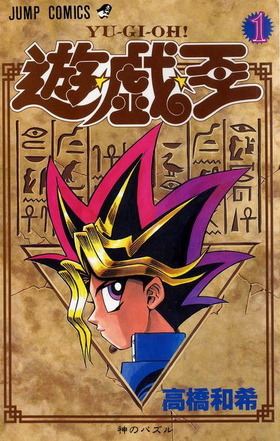
A lot of people prefer the manga. It may even be safe to say that a majority of Yu-Gi-Oh! fans prefer the manga. And I’m sure there are any number of things about the Duel Monsters anime that infuriates them. The animation quality, perhaps. Or the watering down of various plot elements. The sidelining and borderline ruination of Katsuya Jonouchi’s character. All versions of this story have flaws and, for many, I’m sure the anime’s flaws outweigh the manga’s.
That is their prerogative. You will note, I hope, that I leave such fans to their business. My opinion on their preferred canon is not useful to them, so I don’t go out of my way to give it. I would have hoped for the same courtesy in return.
Anon, you were polite in your approach, which is more than I can say for others who’ve confronted me about this topic. With this in mind, I will endeavor to explain why I take issue with the argument you present here, as well as why I don’t like this line of discussion. That may not be what you were looking for in a response, but it’s what I have, and it’s what I will offer.
A note: just because I don’t like the Yu-Gi-Oh! manga doesn’t mean I haven’t read it. I will be using Chapters 1, 9, 10, 24, 25, 27, 39, and 40 to explain my position here. So if anyone reading this hasn’t read the manga, but intends to, keep this in mind before clicking the Keep Reading link. Understand that this is going to be long, it is going to be critical, and I am not open to debate. I have been approached, in my space, and this is going to be my final word on everything I have been avoiding since I started this blog.
If that interests you, then read on. If it doesn’t, then let us part ways here. No harm done. I wish you the best.
Now, then. Let us begin.
The Case Against Inconsistency: Katsuya Jonouchi
Like any story, Yu-Gi-Oh! has various themes that define it. Whether outright stated or just implied throughout, they exist. And one of the things we learn, throughout the story of Yugi, Atem, and their various friends, acquaintances, and antagonists, is this: how people conduct themselves determines their success.
It’s a classic Good VS Evil paradigm, and it’s one that a lot of us are familiar with. How does it play out? Well, in theory, what this should mean is that people who conduct themselves fairly, with honor and integrity, prevail. And people who conduct themselves poorly, with deceit and bitterness, will not. I think that a fair amount of fans of Yu-Gi-Oh! will agree with this idea.
Good people succeed. Bad people fail.
Yu-Gi-Oh! uses its duels like another anime would use a fight scene. When Naruto — or Goku, or Ichigo, or Kenshin, or whichever shonen action hero you fancy — comes up against a new opponent, we expect him to win. Why? Because he’s the hero. He’s the Good Guy™. And that’s how this is supposed to go, right? The hero is supposed to win because if the hero loses, that isn’t fair.
The world isn’t fair, people say. And that’s true. This is why we look to fiction. Or, at least, it’s why I look to fiction. In fiction, the world can be fair. And in a fair world, the good folks win. So that’s what we want to see. We want to see the hero struggle, sure. We want the fight to be hard-won. But we still want it to be won.
In this story’s case, we have Yugi Mutou. He’s our hero. And when we’re introduced to him, we’re given a clear indication of why we’re supposed to root for him.
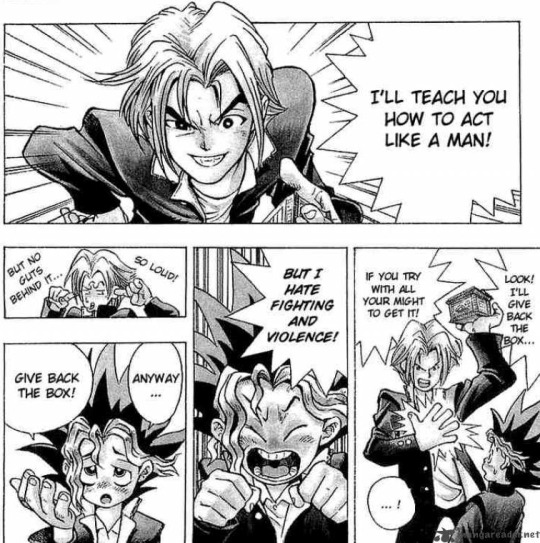
When Our Hero™ is confronted by Katsuya Jonouchi here, right in the first chapter, it’s clear who’s supposed to be sympathetic. Jonouchi is a bully. Taking Yugi’s things away from him and goading him to fight for them. For a story that sets itself up in a high school, this is pretty standard. This is Episode 1 territory. And Yugi, bless him, sets himself up quickly as the good guy. He hates fighting. He hates violence. And those are traits we, as people living in a “proper and civilized” world, should admire.

Hiroto Honda doesn’t come off looking much better. But notice here that, even though Jonouchi and Honda are both antagonizing Yugi, he’s not exactly condemning them. Maybe it’s a defense mechanism. Maybe he’s just scared of getting a rise out of them, because they’re set up as bullies and Yugi is set up as a favored victim. But regardless of why he acts the way he does, I think it’s a pretty safe bet that a lot of people reading this story are going to relate to Yugi, in this moment, before they relate to the other two.
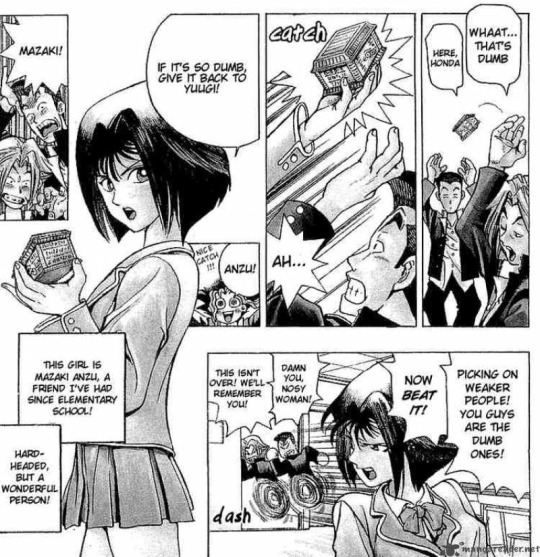
Then, we’re introduced to the second sympathetic character in this opening scene. Anzu Mazaki is quickly established as (1) Yugi’s friend and (2) someone that Jonouchi and Honda are afraid of. This is (tangentially) important to note.
If Yugi has someone willing and ready to protect him, and that someone has the edge over his bullies, then is he honestly afraid of them? Maybe he isn’t. Maybe that’s the point. He doesn’t like dealing with Jonouchi and Honda at this moment, but this presented a question in my head: does he fear them? Are they enemies to him?
Given what happens later on in this chapter, the answer to the former is kind of up in the air, but the answer to the latter is most likely no.
But anyway. A bit later on, we reach the first major point to which I want to draw specific attention. The first major moment that is relevant to why I have take issue with the idea that “Kaiba has literally pushed all his buttons.”
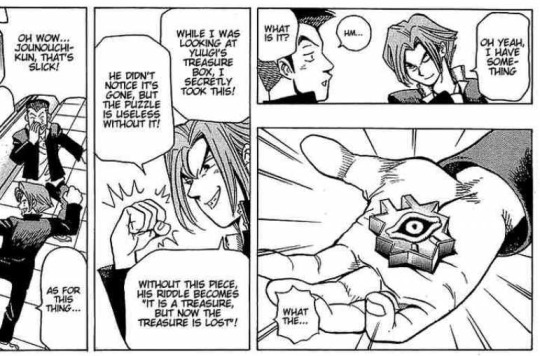
Jonouchi, still angry that things didn’t go his way in the intro scene, has opted to steal a piece of the Millennium Puzzle — which we all know is an immensely important part of this story’s mythology — so that Yugi will never be able to complete it, even if he gets it most of the way there.
The puzzle represents Yugi’s only real goal this early on: he wants friends. He’s heard from his grandfather that the Millennium Puzzle grants wishes, and his wish is for friends. What I mean to point out is that Jonouchi’s behavior here is an immense violation of Yugi’s privacy, and a serious blow against Jonouchi’s integrity. I’ve been robbed before. It’s an absolute travesty, and I have extremely limited sympathy for people who would steal like this. Taking food from a store because you’re starving? I know that’s a classic tactic and maybe it’s a cliché at this point in the game, but still. I’m probably not going to judge anyone for that. Desperate calls and all.
But stealing someone’s most prized possession because you’re sulking? That’s … pretty black-and-white awful in my book.
Some of you might be wondering why I’m going into this much detail about plot elements that occur before Seto even shows up. Others might be wondering how I can say that Jonouchi isn’t worthy of sympathy for what he’s done here, considering what Seto does later on. Well. I’ll get to that.
But for now, consider these points from the remainder of the introduction: Yugi defends Jonouchi and Honda, getting himself beaten up in the process. It’s thus established that these two boys — who are implied to have been bullying Yugi for at least a little while now — are Yugi’s friends. In spite of what we see in the beginning, and in spite of how Jonouchi in particular acts during his introduction, Yugi considers the both of them friends.
The Case Against Inconsistency: Seto Kaiba
Now, then. What about Seto Kaiba, you might be wondering?
When he’s introduced in Chapter 9, there really isn’t much to be said about Seto, other than there’s something off about him. And he really, really wants Sugoroku Mutou’s Blue-Eyes White Dragon.
I want to draw your attention to the first moment when we really sense what’s being set up with Seto’s first chapter.
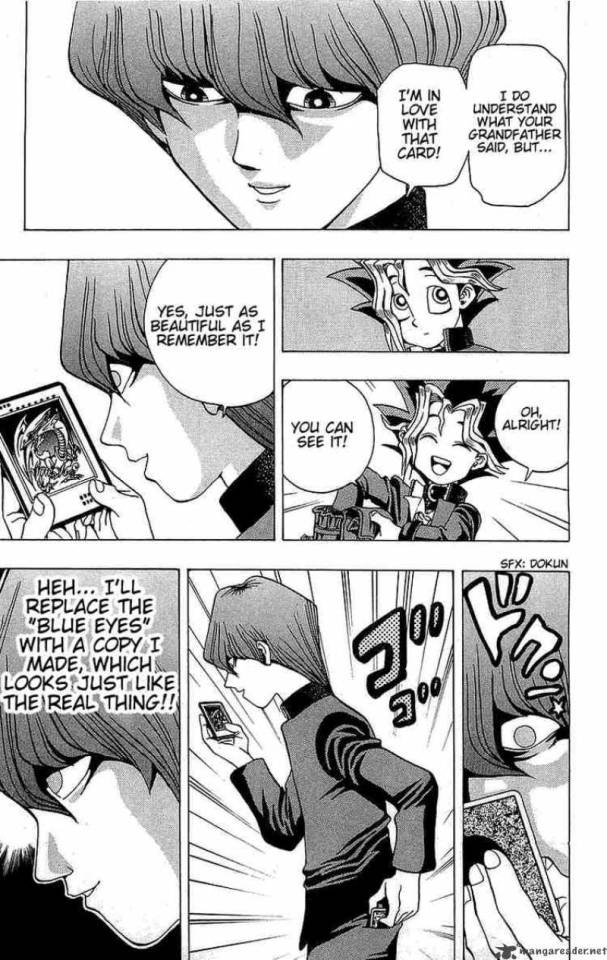
When Seto can’t trade for, or buy, Sugoroku’s card … he decides to steal it. Now. Generally speaking, we would be expected to understand that this is an Objectively Bad Thing™, right? Of course it is. There is no excuse for this kind of behavior. I just covered this.
But recall the specifics: Yugi’s been stolen from before. Does he know that? No. Yugi never figures out that it was Jonouchi who stole that pivotal piece of the Millennium Puzzle. Not directly. But the point I’m making here is: we know it was Jonouchi. We, as the audience, know what happened to the last person who robbed Yugi.
… Absolutely nothing.
This is what I mean when I say that the manga is … weird about enforcing its own rules. Seto Kaiba is set up as a villain for doing the exact same thing Yugi’s own best friend did in the first chapter. Now, let’s look at the other part of Seto’s introductory equation, which occurs when Yugi confronts him about having stolen his grandfather’s prized card.
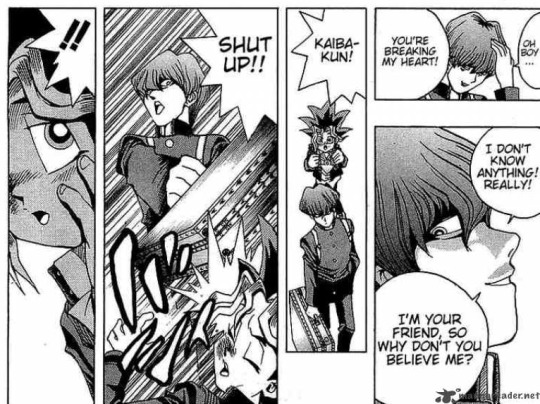
Seto gets irritated that Yugi won’t let this whole thing go, and clocks him across the face. Now. Seto is not shown in a sympathetic light here. I’m not trying to claim that he is. My point with these scenes — aside from transparency — is simply one of consistency.
Aside from the fact that Seto is rich and Jonouchi is not, there is effectively zero difference between them right now … unless you want to count the chronological order of their respective sins. Jonouchi antagonized Yugi, then stole something important to him. Seto stole something important to Yugi, then antagonized him.
Unless you want to get pedantic, in other words, Katsuya Jonouchi and Seto Kaiba are — textually speaking — the same person. The same obstacle. And given what happened to Jonouchi at the end of his chapter … shouldn’t we expect Seto to get off relatively lightly, too? Isn’t that what we know about Yugi Mutou? That he’s a forgiving soul? That’s what I took from the first chapter.
But what happens?
Well, of course, at this point in the story, we’ve been introduced to The Other Yugi™. Atem, as he will come to be known, the spirit trapped inside the Millennium Puzzle, who comes out and possesses Yugi’s body to extract vengeance — or justice, depending on your point of view — on people who trespass against him. We know very little of what Atem is honestly about during this section, though. We don’t even know his name, or have a nickname for him yet.
What we do know is that Atem plays games to make his points. Games which reflect the nature of the players’ souls. Games which exalt the righteous, and condemn the guilty. So what does this other Yugi do? He challenges good old Kaiba-kun to a game of cards.
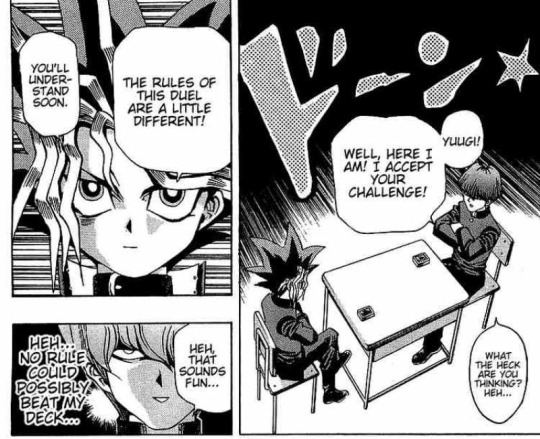
There are a few important points to make about this duel. I’m not going to be giving a play-by-play. Instead, we’ll go over the highlights. First: when Seto realizes that he’s losing the duel, and can’t defeat the spirit, he decides to cheat.
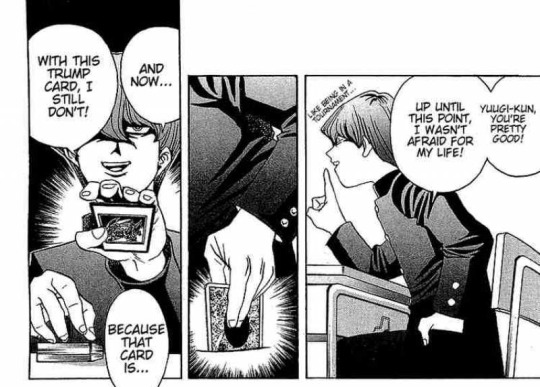
And because this is a Shadow Game, or a Dark Game … a magic game, in other words, Seto is punished. But instead of just disqualifying him and ending the duel, which is what would actually happen if someone cheated like this … it goes on.
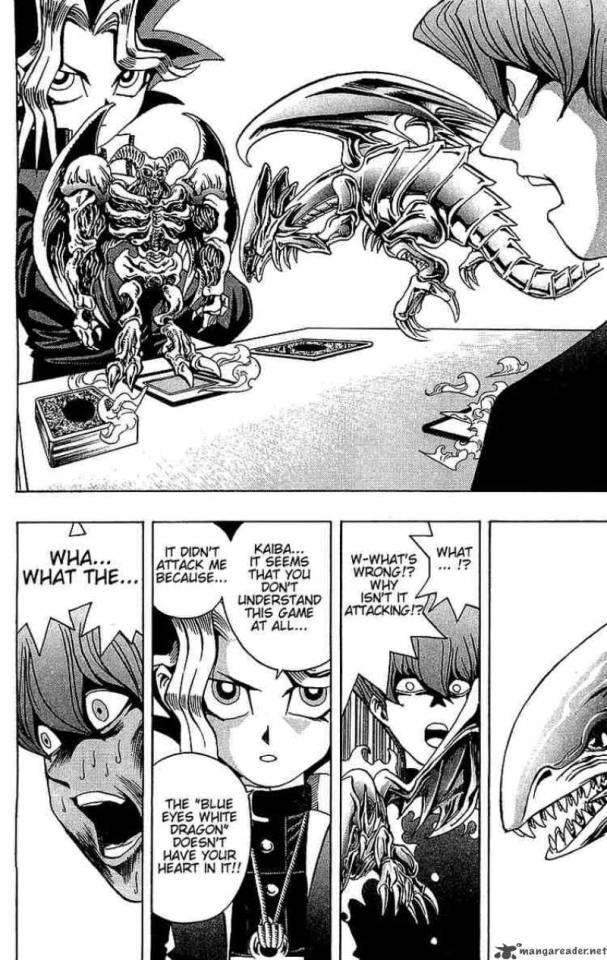
That’s … that is not part of the rules. Nowhere in the initial buildup to this match did Atem specify that Seto’s cards had to have his “heart” in them. And nowhere in the rules of this game does it say that a monster’s attack can be negated by pontificating at it.

Again. This was not established in the beginning of the duel. The rules do not state that a monster that doesn’t belong to the user will be destroyed. Atem did not make this clear when they sat down to play. This is plot armor. Or, rather, a plot weapon. Again, Seto is being punished for cheating. Of course. I cede this point.
But Atem directly benefits from these breaches of the rules. So, by continuing the duel and ultimately winning, he is also cheating. You can’t just decide something like this. Atem did not create this game. He does not have the authority to unilaterally declare how alterations to the rules are decided.
“Well, that guy cheated, so I’m going to cheat, too. And it’s okay when I do it, because he did it first.”
Are we in grade school? That’s the argument being presented, and it doesn’t matter. The duel is canceled and you start over. That is how you handle this. You don’t just arbitrarily alter the rules while the game is ongoing.
But even if you do … you certainly don’t do this when the game is over.
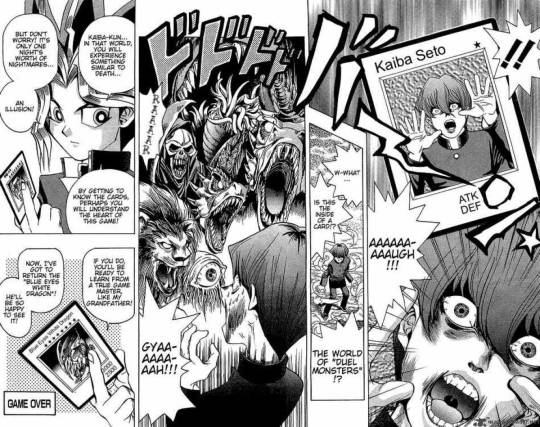
Seto Kaiba is forced, magically, into a literal psychotic break. He is forced through his own death at the hands of the monsters that died throughout the game. Atem claims that Seto shouldn’t worry, because “it’s only one night’s worth of nightmares … an illusion!”
That? Right there? That is horrifying.
Seto cheated at a game of cards. He didn’t commit murder. Is cheating acceptable behavior? No. But the punishment does not fit the crime. Atem condemned a child to his own hallucinatory execution. A child who, you may recall, we later find out grew up in a criminally abusive household, and has just escaped it.
Anon, you acknowledged that Atem is not to be excused, so this next part is not directed at you, but at everyone else who likes to act like Seto Kaiba should be hanged for what he did throughout the manga, but “oh, Atem’s growth is so wonderful and inspiring!”
The above example of other fans’ behavior is facetious and exaggerated and should not be taken seriously. But regardless of how I might view this whole paradigm, it doesn’t change the facts: either they both have crimes to answer for, or they both have redemption arcs worth celebrating.
I do not care what you think about Seto Kaiba. I do not care if you like him. I do not care if you hate him. I do not care if you like or hate Atem. I do not care about Death T. I do not care about how long Atem spent trapped in the Millennium Puzzle. I do not care that Atem sacrificed his life for his country. I do not care that Atem died as a teenager. I do not care how much he eventually grows as a person. I do not care that Seto started this. I do not care that Seto cheated. I do not care that Seto lied. I do not care about any of that.
THIS IS OBJECTIVELY DISGUSTING.
Don’t tell me why you think Seto deserved it. Don’t excuse this. Don’t ignore this. Don’t you dare come into my space and tell me this is irrelevant. I will never let this slide. Seto Kaiba is a child, and he just got what little emotional equilibrium he had, after having survived Gozaburo Kaiba, shattered because he cheated at a game of cards.
Recall, if you please, my previous point.
Katsuya Jonouchi stole from Yugi Mutou, and antagonized him.
Seto Kaiba stole from Yugi Mutou, and antagonized him.
One got a best friend out of it.
One got tortured.
That is not acceptable, and it is not justice.
The Case Against Inconsistency: Mokuba Kaiba
Are we done? No. No, we are not.
There are fewer points to make in this section, so it will be shorter, but there are still important notes to take into account before we move on to the main event.
I always say: you don’t get one Kaiba without the other.
In Chapter 24, we’re introduced to Seto’s little brother.
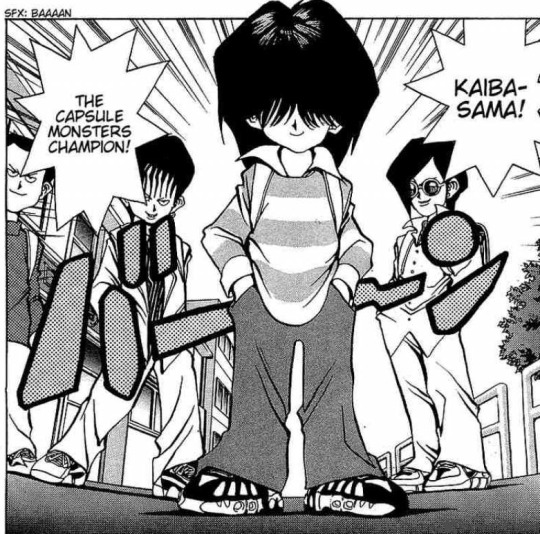
Baaaan.
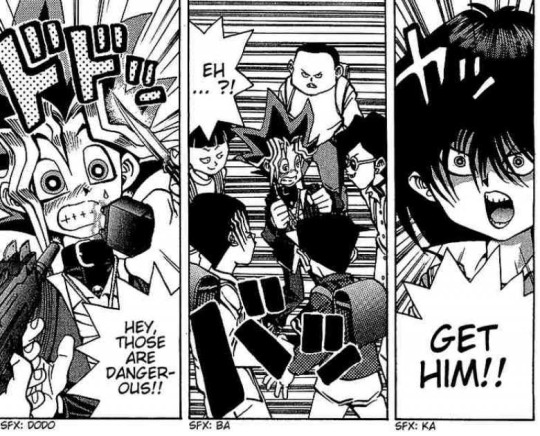
Mokuba is portrayed, initially, just as unsympathetically as Seto is. Like his brother, this kid presents a threat. A pretty substantial one, if those weapons are real. And given the early manga’s penchant for wanton violence, they probably are. For a story about children’s games, there’s a lot of … not-so-child-friendly elements to the opening chapters.
Naturally, given that this is a series about games, there have to be stakes. And Mokuba is very quick to establish what those stakes are.
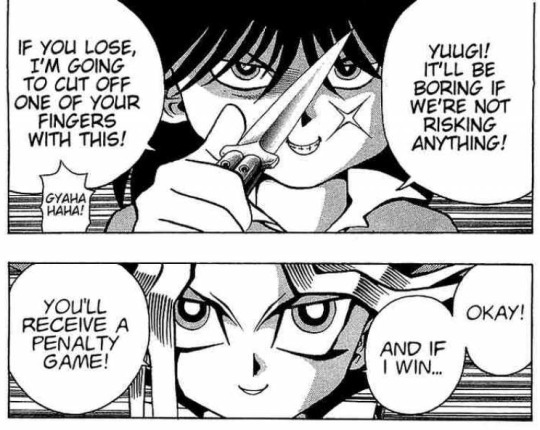
And Atem is equally quick to accept them. Now, look. Obviously brandishing CEWs, assault weapons, and butterfly knives at people are entirely unacceptable actions to take, but these aren’t even teenagers we’re dealing with. Atem is a bit too gleeful for my tastes here, considering he just promised to torture a 10-year-old boy.
These are grade-schoolers.
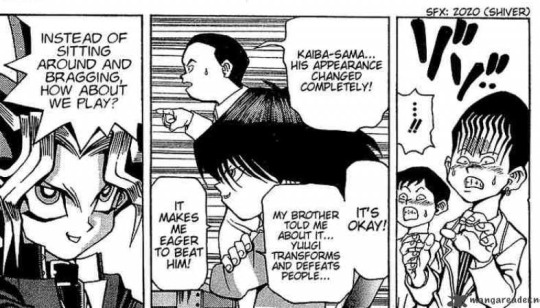
Grade-schoolers who, aside from Mokuba, are obviously unnerved (and possibly frightened) by the spirit of the Puzzle. Now, I’m not saying it would have been smart on Yugi’s part to deny these kids whatever they wanted. But this is why you have a cursed pendant with a ghost inside it to help you out.
But, perhaps it isn’t fair to say that Yugi’s new vengeful friend should have worked harder to dissolve the situation. Maybe that’s not the right argument to make. After all, Mokuba started it. And who knows what he might do if he’s denied?!
Well. Considering what happens when Atem wins this game … I don’t think he really avoided any potential consequences by going along with what his attackers wanted.
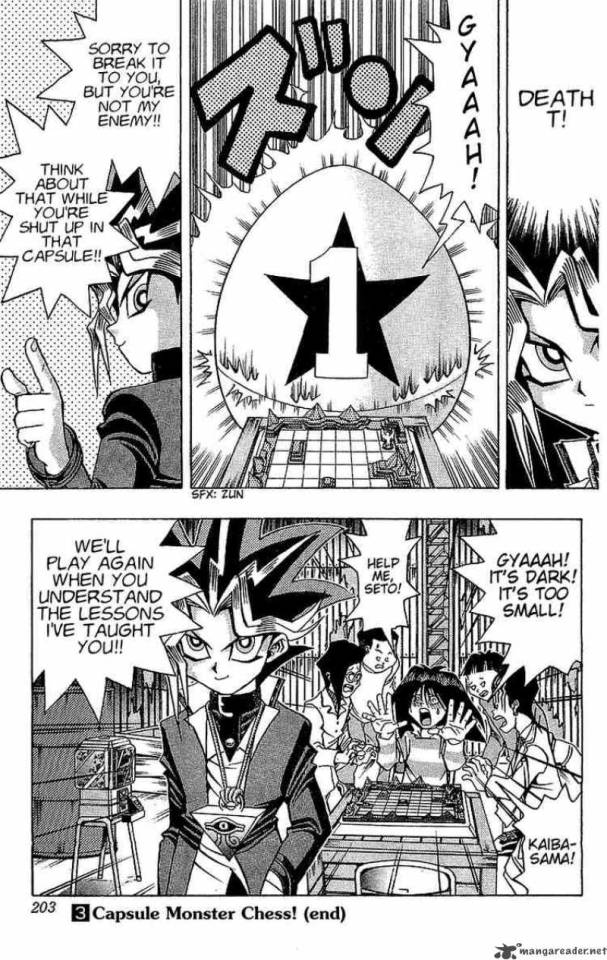
See, you say that, Atem, but I don’t believe you when you say that Mokuba isn’t your enemy. You’ve treated him the same way as you have every other enemy you’ve come across in this story. The only net positive we can say here is that Mokuba doesn’t die.
Now. What’s my point with bringing this one up? Well, one, I don’t think the 10-year-old kid should have been forced into a confined space. What if he’s claustrophobic? What if his father used to lock him in his bedroom? What if, what if, what if. Atem doesn’t know anything about this boy except that he’s lashing out on his brother’s behalf.
And two: when you play with fire …
Obscenely rich, angry, chronically abused fire …
You get this.
The Case Against Inconsistency: Mind Crush
When the chapter that opens up the oh-so-infamous Death T starts, we get treated to two bits of information that are … extremely important to all of this. We are first reminded of what Atem forced Seto through, at the end of their first duel.
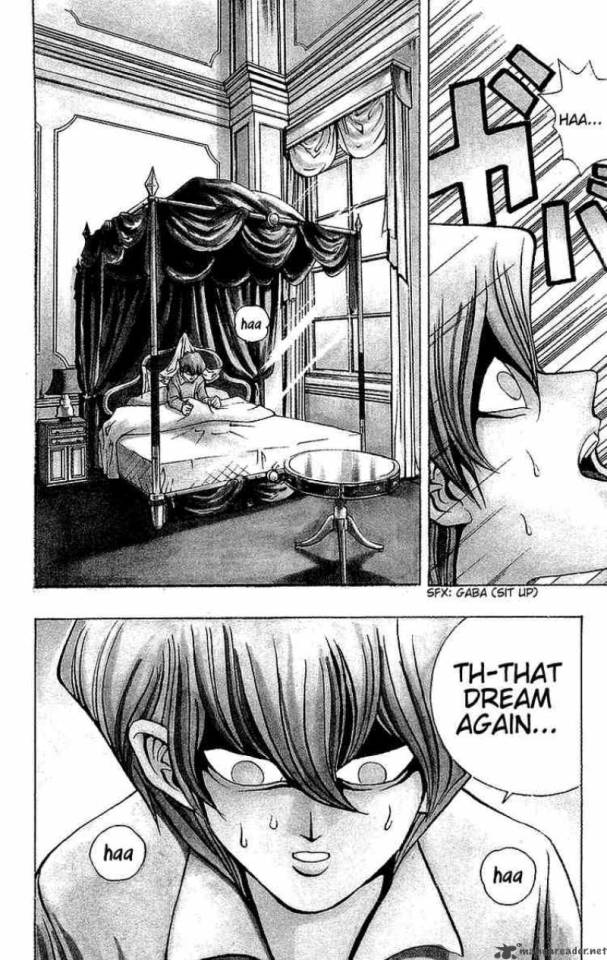
And then we are shown that Atem was wrong about his own consequences. He said, and I quote:
“It’s only one night’s worth of nightmares.”
Remember that? And yet, we see that Seto has had that nightmare at least twice. Time is nebulous in the manga, so it’s difficult to figure out how often he’s had this nightmare, but that isn’t important. He’s had it multiple times.
This is a problem, because our hero said it would happen once.
But it didn’t happen once.
Why is this such a big deal to me? Because when your hero’s entire problem with an antagonist is how dishonest he is, you cannot afford to be dishonest yourself. But here, Atem is shown to have been either ignorant of his own abilities, which is reckless, or outright lying.
Which is hypocritical.
My point is not that Seto Kaiba is blameless. It is not that I want people to stop paying attention to his faults. My point in all of this is that Death T — to which Anon is referring — did not happen in a vacuum, and Atem was partially responsible for it. Death T was not constructed to beat Yugi Mutou in a game. It was, and is, not a sign of Seto’s unhealthy obsession with victory.
Death T was a direct result of two things: Gozaburo Kaiba, and the “Experience of Death” penalty game.
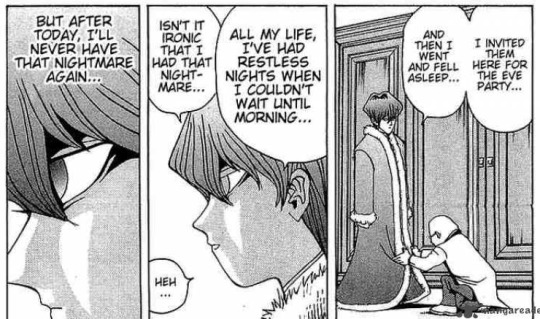
Seto says nothing about losing. He says nothing about being beaten. His whole motive for Death T is to stop “that nightmare.” What does this mean? That if he had not had that nightmare, he would not have that motive. Would he have done something else? Maybe. Probably, even. But we’re not talking about possibilities. We’re talking about what happened.
And what happened is: Seto cheated at a game, was punished by a hallucination, had nightmares about that hallucination, and figured out a plan to stop them. Would Death T have worked? No. Is it acceptable behavior? No. Am I saying Seto Kaiba should be absolved for what he put the main cast through? No.
I am saying that it wasn’t just Seto Kaiba who was responsible for this.
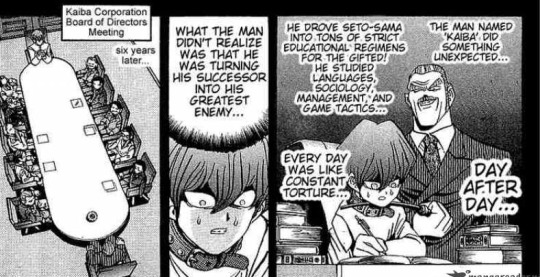
There was also Gozaburo Kaiba, who tortured his adopted son to mold him into the heir that he wanted.
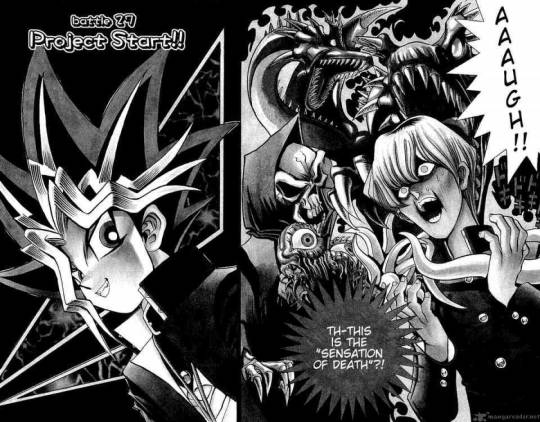
And Atem, who tortured his classmate to mold him into the opponent that he wanted.
You aren’t going to find many people willing to give Gozaburo Kaiba the benefit of the doubt. He’s pegged pretty constantly for the villain he is. Seto is also held accountable for the horrible things that he did. Death T was, and is, an atrocity. But Atem’s hands are not clean. He directly antagonized an unstable teenager with PTSD, one with the resources, the conviction, and the warped sense of right and wrong (courtesy of his aforementioned abusive father) to push right back.
Was it right? No. Was it fair? No. Was it acceptable? No.
So why talk about it?
Because when you say things like “Kaiba has literally pushed all his buttons,” you absolve Atem of what he did.
Atem tortured, and killed, several people in the name of justice.
The Kaibas were just the first of his victims to fight back.
Seto Kaiba pushed Atem too far? Fine.
Atem pushed him too far, too.
And only one of them ever gets taken to task for it.
If it makes me the Devil’s Advocate to focus on that, and harp on it, and get angry about it … so be it. I’m used to being the voice of dissent. And just so you all understand: I don’t like the way Seto is portrayed in the manga. I hate it. I hate him. That’s why I don’t deal with him. That’s why the anime is my focus. That’s why I don’t talk about the manga. I don’t like Seto, I don’t like Atem, I don’t like Honda, I don’t like Otogi, I don’t like Pegasus, I don’t like the Ishtars.
I don’t … like … the manga.
But, that being said.
No matter what he did.
No matter how far he went.
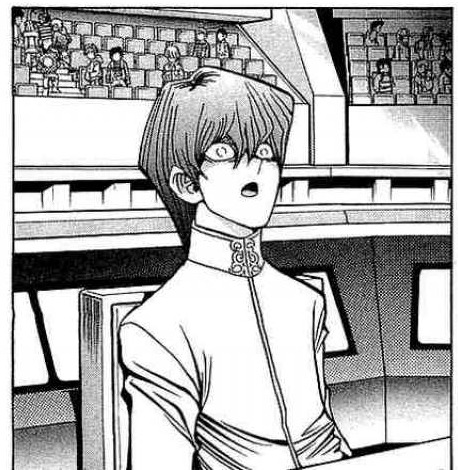
This is not heroic.
This is not worth celebrating.
This is not my Yu-Gi-Oh!
And I’m done talking about it.
#i'm not tagging this the way i usually do#i'm serious when i say i'm not open to debate#so i'm not tagging it with any series or character tags#there is only one relevant tag here#i stand with the dragon king
63 notes
·
View notes
Text
7 Effective Ways To Free Yourself From Your Insecurities
New Post has been published on http://healingawerness.com/getting-healthy/getting-healthy-women/7-effective-ways-to-free-yourself-from-your-insecurities/
7 Effective Ways To Free Yourself From Your Insecurities
Harini Natarajan Hyderabd040-395603080 July 23, 2019
“Don’t let fear or insecurity stop you from trying new things. Believe in yourself. Do what you love. And most importantly, be kind to others, even if you don’t like them”- Stacy London
As human beings, we experience a spectrum of emotions. While happiness and sadness are some very common feelings, insecurity and anxiety are a bit more difficult to understand. However, most of us feel insecure in our lives. Dealing with insecurity is often tough because you often cannot put a finger on why you are feeling inadequate.
Insecurity is a feeling wherein a person constantly feels not worthy enough or inadequate in some way or the other. When the question ‘Why am I insecure?’ is always on your mind, constant validation becomes a necessity to stay happy. This feeling can turn into jealousy and lead to a lack of trust between two loving partners. That’s when the blame game begins. You start saying things like, “You said this or you did that, which is making me feel insecure.”
But, the truth is that these are your irrational thoughts and fears that you are projecting on your partner. If you relate to all that we have said until now and want to deal with your insecurity in a healthy manner, you have come to the right place. Here are seven effective ways to win the battle with your insecurities.
1. Embrace It Like Your Own And See Its Beautiful Side
The best way to stop feeling insecure is to embrace it wholeheartedly. Don’t consider it a villain. See it this way: when you get a wound, you recover from it and wear the scar with pride. Similarly, put a positive spin on your insecurity and see it as something you can overcome every day.
Insecurity is nothing but the vulnerability of spirit. Normally, it is your humility that does not let you get ahead of yourself. But when you feel insecure, your pride beats down your humility. At such times, you may find it challenging even to hold a normal conversation with your partner.
To deal with such insecurity, start converting your feelings of unworthiness into humility and address it with positive affirmations. Remember, at every juncture that insecurity pulls you down, it is your self-awareness that can keep you afloat.
2. Keep A Record Of Your Self-Esteem File
One of the biggest antidotes to insecurity is high self-esteem. When you are dealing with insecurity, start by analyzing where your self-esteem stands.
Start by complimenting yourself every time you feel insecure. These compliments can be as simple as “I like my shoes” or as big as “I am a great advisor.”
Replace the question “Why am I so insecure?” with “How can I better myself at things that make me confident?” Transforming your negative thoughts into action-oriented ones this way will help you overcome your insecurities.
3. Avoid Anyone Who Makes You Feel Insecure
While this seems like one of the most straightforward ways to deal with insecurity, it is still one of the most challenging ones to practice. Now, if your boss is nagging you continuously and making you feel incapable, it is not really possible to stay home every day. Same goes for your partner or parents making you feel insecure. But, sometimes, you can simply rearrange your schedule or figure out the triggers behind the nagging.
For instance, maybe there is a group of girls at work who dress glamorously all the time, which makes you feel intimidated. We don’t recommend that you don’t talk to them at all because you feel less beautiful than them, you can always avoid going out partying with them.
It is best to just surround yourself with people who make you feel positive and happy.
4. Keep Your Batallion Of Supportive People Ready
When it comes to ways to deal with insecurity, this is perhaps one of the most overlooked ones. Even the most social of people have only a handful of trusted people who understand them. These people genuinely get them and truly wish to be with them. Whenever you feel insecure, recognize these people in your life who are pillars of strength.
Take 10 minutes out of your day to talk things out with them every time you feel insecure. While we understand that you cannot ask for validation all the time, you can find some ways to gain mental support.
5. Remember That Insecurity Wears An Invisible Cape
While we strongly recommend wearing all your challenges like a badge of honor, people struggling with insecurity don’t really feel so. Unfortunately, our societal conventions confine us. We feel that we should look a certain way, feel a certain way, and carry ourselves in a certain way to look confident to other people.
But, when you are mired in your insecurity, remember that only you can see it. Insecurity is invisible and nobody can really see through you – not even your partner. One of the biggest advantages that you face when you are feeling insecure in your relationship is that only your actions can make your partner realize how you are feeling. There is no other way for them to figure it until you do not start acting different or start having trust issues.
So, one very effective way to deal with insecurity is to convince your mind that only you can see it. It is your relationship with insecurity that you need to take care of first before healing your relationship with your loved ones.
6. Learn To Value Yourself
Every time you feel insecure, you are focused on feeling something that is lacking in you. It would help if you remembered that you add value wherever you go because you bring an absolute uniqueness that only you can provide. In balanced relationships, both people possess qualities that complement each other. When you are dealing with relationship insecurities, you need to remember that it is your personal traits that are contributing 50% in maintaining a healthy equation.
7. Keep Your Independence Intact
This one is for people dealing with relationship insecurities. Sometimes, we mistake unhealthy dependence for love. We forget that if we cannot love ourselves, we render ourselves utterly incapable of giving somebody else the same love. One of the biggest reasons for feeling insecure in a relationship is getting extremely involved in the other person’s actions and forgetting how much it affects us.
Hence, keep your dependence healthy. Keep it limited to “What should we eat today?” or “When should we buy our house?” Decisions that basically require consent from both partners are the ones that you should keep dependence limited to. But, so many people depend on their partners to build their identity. They help them decide their clothes, their hairstyles – sometimes even what they eat! A relationship needs independence and breathing space to keep insecurity away. Hence, your identity should be your own.
All of these pointers can help you burst that bubble of insecurity that is holding you back. Remember that you feed insecurity, and it is a small part of the magnificent you. It does not need to become you! Do not give anything so much power that it takes over your life and mental well-being. Keep these simple things in mind and never let insecurity get the better of you!
The following two tabs change content below.
Latest posts by Harini Natarajan (see all)
Harini Natarajan
RELATED ARTICLES
Source: https://www.stylecraze.com/articles/how-to-stop-being-insecure/
0 notes
Text
Louie C.K. and the Sith Lord Dilemma
Happy new year!
(These are the kinds of headlines I only get to write because I don't have an editor to whom I answer. Whee!)
We still have Nazis, so let's talk strategy. I'd also like to talk about something related - the infamous, often contested Centre. To keep advancing leftist ideals (such as healthcare, housing, and basic needs coverage for all; universal access to education and higher education; equal and fair pay for all genders and backgrounds, and accessibility resources for those who require mobility devices or have medical problems, among a few other things!) it can help to figure out who we're trying to talk to - and sometimes, who we can trust.
The time before #MeToo and after it are now crisply delineated by this social event. The freedom to talk about and voice the universality of sexual harassment and assault against people of various genders (yes, men too) has really shaken things up. It's just the beginning of making things right, and society in North America and around the world has some serious adjusting and compensating to do, but it's a good step in the right direction.
#MeToo also torched a lot of sacred cows, exposing people we previously trusted as participating in very bad behavior. Kevin Spacey, George Takei, Stan Lee and Neil DeGrasse Tyson, among others, are a couple who surprised and disappointed me the most. But it seems like some of the people who transgressed are already trying to stage their comebacks - not understanding, it seems, that it shouldn't be up to them to decide when their stint in the time-out corner is over.
As discussed here, it would seem that Louis C.K., who previously admitted to sexually harassing women by masturbating in front of them without consent, has taken a turn for the dark side. Making jokes about transgender people and school shooting survivors, and apparently, insulting black and Asian men, is now part of his comedic repetoire. So much for "learning and listening."
But he continues to be defended by a few people who - apparently, come from the centre - and want to believe that he still has good intentions somehow. To quote that Huffpost article, however -
"C.K.’s new set, according to its leaked version, doesn’t merely punch down; it stomps, pettily, to the bottom. None of it is smart or brave; it is simply cruel."
And how did Louis C.K. - and for that matter, J.K. Rowling - start to internalise and support such negative beliefs?
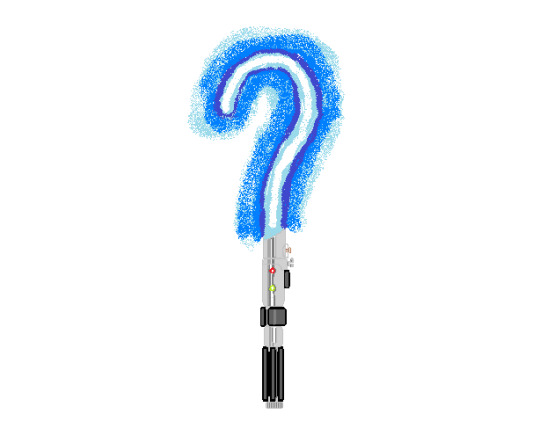
Star Wars and political strategy
So here's the thing about the two people I've alluded to - they're both wealthy, and they've both been criticised. Now, being criticised is hard at the best of times. But wealth tends to make people more fragile. Is the answer, then, to just not criticise anyone ever? (That probably sounds like a stupid thing to even say, and it kind of is. But the internet likes a good reductio ad absurdum argument, taking things to their most logical extreme, so I'm going to follow that format - as I often do in my posts!)
That would seem to be an over-correction, and to make advancement impossible. But how to we criticise someone without alienating them?
Well, I'm still working on the "doing it right" part, but I can tell you about how not to do it.
In the much-maligned prequels of Star Wars, one of the concerns expressed about Anakin Skywalker is that he's too old to learn the Jedi ways and be successfully indoctrinated in their belief system. In the following movies, as Anakin goes through puberty and discovers that at least one girl exists, this is quickly proven - so it seems - to have been an accurate fear. A lot of people have argued that the way the Jedi turned their back on him as soon as he started to screw up and the way they endorsed such extremist perspectives on emotion had doomed him to fail in the first place. I would say that Anakin actually got a lot of second chances, but the ideology did set him up to fail - and because a single misstep was seen as an inevitable sign of failure, how could he help but find himself tempted by the apparent freedom of the Dark Side?
But as we see examined in The Last Jedi, fearing someone's future and darkness and treating them badly on the basis of that can, in fact, lead to a self-fulfilling prophecy. By assuming the worst of Ben Solo, he becomes Kylo Ren. Now - you could argue about the role of fate in the Star Wars universe, and even in our own, but it's not a discussion I can brook in good faith because if fate was as iron-clad as it is in fiction, all psychics would have 100% accuracy in their predictions - and that, obviously, is not the case.
But are we repeating the mistake of the late-era Jedi Order? Are we scaring off allies when we call them out for bad behavior, or scaring off future allies when they see Leftists chewing someone out?
A digression on the centre, which cannot hold
Oh, the Centrists. The Left hates them, the Right courts them, and they usually don't even identify as such. Most of the time - from what I've seen - Centrists are actually people who would identify as liberals or Liberals, but haven't caught up to every nuance; alternatively, they're soft conservatives. The centre isn't so much a fact as a product of two overlapping political bell-curves, more of an illusion than a real political movement. After all, the centre and centrists usually tend to have either conflicting beliefs or a reluctance to engage with certain groups.
But the centrists that I tend to hear about, as a leftist, are generally the ones who still fall on the liberal side of the equation. Now, here's the thing - I'm not saying that being conservative or liberal are, arbitrarily, either good or bad on an objective scale. BUT - right now, in North America and in a few other places, it sure seems like conservatism has relied too heavily on courting xenophobia in various ways. And that has led to an association of conservatives with racist, sexist, generally horrible beliefs - for instance, the Republicans in the US, and more locally, the UCP. (United Conservative Party, not to be confused with the Progressive-Conservative Party of Canada. They're very good at being polite and rewording their racism and homophobia, because this is Canada, but the underlying platform and beliefs is disappointingly rote.)
But is falling to the racist wayside the fate of all centrists? Should leftists treat anyone who fails to meet certain standards of conduct with suspicion and curtness, because they're inevitably going to betray any progressive ideals in favor of the fear-eater, conservatism?
In terms of the radicalization of young men, a number of people have spilled ink and filled hard drives creating better and more informative videos and articles than myself. And a lot of them also struggle with this problem: who can be reasoned with, and who is a die-hard danger to humanity?
No. Be nice sometimes, but don't hug every Nazi.
All of this is to say that I think the way we deal with people who don't act in good faith and the ones who do act in good faith need to be set in two different streams. It can be hard to tell, and people can switch motivations during a conversation - deciding to troll or being interested enough to start learning, for instance. But I think it would help the Left to confine some of our sharpest criticisms to internal dialogues - you know, saying things with the door closed. We have to meet people on their level.
Unfortunately, sometimes that level is also going to mean putting boots on the ground in terms of showing up to protests and engaging in adequate self-defense against Nazis.
So when it comes to Cousin Jason or Brayden saying that he thinks these dudes wearing yellow vests and talking about how we need to reduce the number of immigrants coming to Canada "might have a point," I would suggest being hard on the ideology and empathetic with Jason or Brayden himself. There's a difference between being empathetic and being a doormat - but we have no choice except to take on these conversations whenever we can, even when we're exhausted. The problem is that people in the centre often agree with us - but are too scared to speak up, or too tired, or even too confused.
We have to make a better future and present by walking the line between having boundaries and making it clear to people that we care about them and their rights. As frustrating as it can be, emotional labour from a person in a position of power, or even an oppressor, is still emotional labour. And we cannot take for granted that people will educate themselves, or yell "educate yourself!" in every conversation. That doesn't mean the most oppressed person should always yield their time and energy to people who may be acting like blockheads - but it does mean that anyone who considers themselves an ally needs to step up or be willing to tag-team something to avoid their own exhaustion.
This stuff is intricate. The problems don't have quick, glib, easy fixes. But they're also not insurmountable, because our opponents aren't monsters or fictional villains. They're people. And most of them actually want what we want - to live in happiness, health, and safety.
***
Michelle Browne is a sci fi/fantasy writer. She lives in Lethbridge, AB with her partners-in-crime and their cat. Her days revolve around freelance editing, knitting, jewelry, and nightmares, as well as social justice issues. She is currently working on the next books in her series, other people's manuscripts, and drinking as much tea as humanly possible.
Find her all over the internet:
The mailing list * Amazon * Medium * Twitter * Instagram * Facebook * Tumblr * OG Blog
#nazi#louis ck#new year#politics#left#leftist#centrist#movement#metoo#me too#assault#weinstein#harassment
0 notes